Masters GPA for PhD: Doctorate Acceptance Guide
What is an acceptable masters GPA for PhD programs? For some students, their grade point average ceases to matter after completing an undergraduate degree.

If you are pursuing further education, though, you may be wondering how important it is.
Editorial Listing ShortCode:
The impact of your GPA can vary throughout your academic career. Its importance can also vary based on your field of study and your intended career goals.

Masters GPA for PhD Programs
A higher GPA, or grade point average, can be useful for gaining admission to a Ph.D. program.
At most colleges and universities, GPA is calculated by assigning a quality point on a scale of zero to four for each letter grade you receive on your transcripts, as follows:
The quality points for all the courses you have completed are then added together and divided by the number of courses to get a mathematical average. For instance, if you earned an A in every course, you would receive a 4.0.
Do PhD Programs Look at Masters GPA or Undergrad GPA?

Most PhD programs look at both your graduate school GPA and your undergraduate GPA. With most programs you need a masters to get a PhD , so your masters GPA will likely be regarded as the more important of the two in the admissions process.
If your undergraduate GPA was less than satisfactory but you showed consistent improvement with your graduate GPA, admissions officials will likely consider this to be a strength.
What GPA Do I Need for a PhD?
How high your GPA needs to be depends on the school and PhD program you’re applying to. Some students wonder how to get into graduate school with a 2.5 GPA . The fact is, minimum GPA requirements commonly range from 3.0 to 3.75.
But the good news is that some PhD programs may also evaluate you based on your work history, personal statements, or interview. So don’t give up your dream of earning a PhD simply because your GPA is not as high as you would like.
Does Grad School GPA Matter?

Both during and after graduate school, your GPA provides a quick way for you and others to evaluate your overall academic performance.
Role of GPA During Graduate School
In graduate programs, you often need to maintain a minimum GPA in order to keep a scholarship or qualify for fellowships.
At this stage of your education, the significance of GPA does decrease somewhat as compared to during your undergraduate studies. Instead, conducting research is typically seen as a more significant accomplishment by many professors.
Role of GPA After Graduate School

How important GPA is after graduate school can depend on where you want to go. For those hoping to earn PhDs or pursue careers in academia, your graduate school GPA can continue to have some importance.
For those planning to start a career, some employers may be impressed by a high GPA as an indicator of potential and likely job performance. Others may place more of an emphasis on work experience or other factors.
To find out how important GPA is in the field where you want to work, you may want to ask people who already work in that field. You can also ask about other qualifications that may be more important to potential employers than GPA.
What Is a Good Master’s GPA for PhD Programs?
You may be wondering how high of a GPA your desired doctoral program will want you to have. A high GPA is generally helpful to gain admittance, but doctoral degree programs can vary widely in terms of expectations for your GPA.
Also, there are some universities with low GPA graduate schools that may be of interest to students who earned lower grades in their masters or undergraduate programs. These are often the easiest doctorate degree programs to gain admission to.
You can usually find out the GPA expectations for a specific program by visiting the school’s website. The competitiveness and field of study of a program are some factors that can affect a program’s minimum GPA standards.
Competitiveness
PhD programs vary in terms of both size and the number of students applying. At a prestigious or reputable school that many students want to attend, the minimum GPA could be quite high.
Lucrative fields, such as law and medicine, can also have highly competitive doctoral programs. Setting a high minimum GPA requirement can provide the school with a way to filter out applicants. A higher GPA can indicate that you value your education and have potential to perform well at the doctoral level.
Field of Study

Applicants often wonder how hard is it to get into graduate school for psychology , engineering, or business administration, Well, a degree program in a popular field of study, such as computer science, will likely have many applicants. A popular program with many applicants will likely have higher minimum GPA requirements.
Some programs evaluate more than just your cumulative GPA. They may also consider your grades in specific courses that are especially relevant to the field you are pursuing.
How to Get Into a PhD Program with a Low GPA

If you want to earn a PhD but did not earn a high GPA during your graduate studies, you may be concerned about whether you have a good enough GPA for PhD programs. A low graduate GPA is not the end of the world, and it does not have to be the end of your education. How to get a PhD degree?
Here are some tips for pursuing acceptance in a PhD program with a low GPA:
- Look for programs that emphasize other admissions factors . Some PhD programs emphasize and prioritize other admissions factors more highly than GPA.
- Look for programs that emphasize undergraduate GPA . If your undergraduate GPA was higher than your graduate GPA, you might look for PhD programs that emphasize undergraduate grades in their admissions process.
- Take the GRE or GMAT . Earning good scores on a standardized test can help you compensate for a low GPA.
- Emphasize your achievements . This can include volunteer work or the completion of an internship related to your field of study.
- Explain your low GPA . If there is a legitimate reason why you did not earn a high GPA as a graduate student, you can often explain this in an admissions interview or in your personal statement. Many schools will take special circumstances into account.
- Try to network . If possible, try to network with people at the school to which you are applying.
- Complete relevant coursework . You can often enroll in classes at your chosen school as a non-degree seeking student. By working hard and doing well in a class that’s relevant to your desired PhD program, you can demonstrate your current academic abilities.
- Apply for probationary admission . Some schools will accept students who do not meet PhD GPA requirements on a probationary basis. After taking classes for a semester, students may then gain full acceptance if their GPA improves.
It is possible to get into a PhD program without having an extremely high graduate GPA.
How Much Does GPA Matter in PhD Admissions?

Your GPA can be an important factor in PhD admissions, depending on the program. Many schools have minimum GPA requirements for doctoral applicants, and doctoral GPA requirements are usually higher than those for graduate degree programs.
Your GPA is just one piece of the puzzle, though, when it comes to PhD admissions. Universities know that grading can be a somewhat subjective process. Different schools can grade differently, and even different professors at the same school may grade differently.
Comparing applicants based on GPA alone is generally not an effective way to find the best students. Your grades in certain individual courses may be more relevant to your current field of study than your cumulative GPA.
A high GPA increases your likelihood of being accepted into a PhD program, but other admissions factors are considered too. If you did not finish your graduate degree with a high GPA, you can focus on other aspects of your application to try and stand out from the crowd.
Admissions Requirements

Here are some common admissions requirements for PhD programs:
- Minimum GPA of 3.0
- Statement of purpose
- Letter of recommendation
- Work experience
Admissions requirements for institutions can vary widely. Some schools ask for GRE or GMAT scores, but standardized test scores are now optional for a growing number of schools. If you do not have a high GPA, though, you may want to submit GRE or GMAT scores even if they are optional. A solid personal statement or letter of recommendation can be helpful as well.
Does Your Masters GPA Matter for a PhD?

Admissions committees for PhD programs do pay attention to GPA. Your grade point average is a general indicator of how well you have performed academically over the past years of your education.
If you have a high GPA, admissions committees are more likely to trust that you are motivated and that you make the most of educational opportunities. They also typically review exactly what courses you took while earning your GPA. A high GPA looks even better if you took challenging coursework relevant to your chosen field of study.
Getting Your Doctorate Degree Online

Online doctoral programs are becoming more popular. If you are an aspiring PhD student, there are currently many program options available online. There are a variety of programs available to suit students from a wide variety of academic and personal backgrounds.
Online programs are known for their convenience, as they offer more flexible scheduling than traditional degree programs. Much like earning a masters degree online , earning a doctorate online can enable you to balance rigorous academic work and the completion of a dissertation with your other work and life commitments.
You can start your doctoral journey today by exploring accredited universities!

Master’s GPA for PhD: Your Questions Answered
Are you considering a PhD program? Are you wondering what is the ideal master’s GPA for PhD admission? If so, then this blog post is for you.
Here, we will discuss everything from the average master’s GPA needed to get into a PhD program to tips on how to maximize your chances of admission. Whether this is something that has been in the back of your mind or something that would require serious considerations and possible adjustments, getting into a PhD program can positively transform your future. We are here to give you helpful advice about going through that journey so read on!
Should You Care About Your GPA At All If You Want to Do Research?
According to the Council of Graduate Schools Survey of Graduate Enrollment and Degrees , there was a significant increase of 8.7% in applications for admission to graduate school between Fall 2020 and Fall 2021. Master’s Colleges and Universities saw a rise of 17.9% in applications, while Doctoral Universities with High Research Activities saw a growth of 16.2%. At the doctoral level, there was a substantial increase of 8.9% in applications to graduate school between Fall 2020 and Fall 2021. With these numbers, students who do not have high GPAs may worry about their chances of getting admitted into graduate schools. Nonetheless, a low GPA does not necessarily disqualify students from being admitted, as schools evaluate other criteria when reviewing applications for advanced degree programs.
What GPA Do I Need to Get Admitted into a PhD Program?
The required GPA for graduate school varies based on the specific school and PhD program you are applying to. While some students may be concerned about how to gain acceptance into graduate school with a 2.5 GPA, it’s important to note that most programs commonly require a minimum GPA of 3.3.
There is good news for those who aspire to earn a PhD but have a lower-than-desired GPA. Certain PhD programs may take into consideration your past professional experiences, personal statements , or interview performance during the evaluation process. So, don’t abandon your dreams just yet – a PhD may still be within reach.
Does GPA Matter in PhD Admissions? If so, How Much?
Your PhD admission chances may depend on your GPA, as many programs have minimum GPA requirements that are higher than those for graduate degree programs. However, PhD admissions committees consider multiple factors beyond the GPA because they recognize that grading can vary between schools and even between professors at the same school. Therefore, they take a holistic approach when evaluating applications. If your GPA in your previous graduate program was not as high, you can still work on highlighting other strengths in your application to distinguish yourself from other applicants.
Understanding The PhD Program Landscape
PhD programs have different sizes and numbers of applicants. A reputable school or a school in high demand may have a very high minimum GPA requirement. Schools set high minimum GPA requirements to filter out applicants.
When selecting universities, it’s important to be practical and to conduct thorough research about the institutions. To determine both your likelihood of being admitted into a program and if it’s a good match for you, consider speaking with both an admissions counselor and faculty members in the department. While a graduate school may sound promising based on the description alone, it’s essential to know if the culture and working relationships will meet your needs.
While students who don’t get admitted into highly competitive schools may initially feel disappointed, it can be advantageous in the long run for certain students. Some students have found that lower-ranked programs can offer a more positive experience due to supportive alumni, a friendly student community, and helpful faculty.
What Is a Good Master’s GPA for PhD Programs?
You might be curious about the GPA requirements of your target doctoral program. While a high GPA is typically beneficial for admission, the expectations for GPA can differ greatly between doctoral degree programs. Additionally, there are universities with graduate schools that accept lower GPAs, which could be a viable option for students who received lower grades in their undergraduate or graduate programs. These programs may be considered easier to gain admission to. To learn about the GPA requirements of a particular program, you should check the school’s website. Keep in mind that minimum GPA standards may vary depending on the program’s competitiveness and area of study.
Do PhD Programs Care About a Master’s GPA?
Having a good GPA can significantly impact your chances of getting into a PhD program. Your GPA reflects your academic performance throughout your education, and admission committees usually take note of it. A higher GPA indicates that you are driven and have made the most of learning opportunities. Additionally, committees usually review the courses you have taken in conjunction with your GPA. If you have a strong GPA and have taken challenging courses related to your field of study, it will enhance your application.
PhD admissions committees use a student’s Master’s degree GPA to assess their potential for success in future studies. Even if the Master’s degree is in a different field than the PhD program, the GPA still shows the applicant’s capability to handle advanced coursework, concentrate, and overcome difficulties.
Your grades in both undergraduate and graduate school are important, but your graduate school grades carry more weight. If you excelled in a master’s program at a reputable institution in the same field as the program you are applying to, it can make up for any deficiencies in your undergraduate transcript.
When reviewing grades, admission committees aim to answer two questions: does the student have a strong foundation in the areas that are deemed essential for success in their proposed field, and can they work well in that area? Additionally, they are interested in assessing whether an applicant can complete graduate courses without any failures, retakes, or any need for excessive personal attention. This is to ensure that the applicant can balance coursework and research without spending an extensive amount of time solely on passing courses. They are looking for students who are prepared to engage in research and also take more advanced courses to enhance what they already know.
Is it possible to Get Into a PhD Program with a Low GPA
If you have a low graduate GPA and wish to pursue a PhD, you may be worried about meeting the GPA requirements for doctoral programs. However, a low GPA does not signify the end of your educational journey, and there are still options available to you.
Here are some tips to help you get admitted into a PhD program despite having a low GPA:
- Take the GMAT or GRE . Scoring well on a standardized test can serve as a way to make up for a low GPA.
- Provide an explanation for your low GPA . You can explain a legitimate reason for a low GPA during your graduate studies through an admissions interview or in your personal statement. Some schools consider special circumstances.
- Enroll in a terminal master’s degree at another school . A terminal Master’s degree can be an excellent way to prepare yourself for a PhD program. It can provide you with the opportunity to develop and hone your research skills, deepen your subject knowledge, make important connections in academia that will support your future career, and raise your GPA. By enrolling in a terminal Master’s degree at another school than the one where you were planning to pursue a PhD, you can get an outside perspective on current issues and research trends in your field.
- Sign up for relevant coursework . If you’re not pursuing a degree at your target school, you can still take classes as a non-degree-seeking student. By performing well in a class that pertains to your desired PhD program, you can showcase your academic skills and apply the following year.
- Ask for probationary admission . Some schools may allow students who did not meet the required GPA for a PhD program to enroll on a probationary basis. If these students take classes for a semester and improve their GPA, they may then be fully admitted into the program.
Final Words
Earning a master’s degree GPA is important to get admitted into PhD programs. Your GPA reflects hard work and dedication, and it is a concrete indicator of your ability to complete the rigors of graduate-level studies. Although a low GPA can be a major obstacle in PhD admissions, it doesn’t have to be an insurmountable one. With careful planning and hard work, you can still make your dream of pursuing a PhD come true. If you’re looking for some extra help in addition to the hauling slog of application preparations we provide PhD application services that can give you an advantage and increase your chances of success in finding admission into one of the prestigious postgraduate programs of your choice. So invest time with proper planning, stay motivated, and finish strong with confidence while applying to a PhD program – you were made to do this! Got questions? Sign up for a consultation . It’s FREE!
With a Master’s from McGill University and a Ph.D. from New York University, Dr. Philippe Barr is the founder of The Admit Lab . As a tenure-track professor, Dr. Barr spent a decade teaching and serving on several graduate admission committees at UNC-Chapel Hill before turning to full-time consulting. With more than seven years of experience as a graduate school admissions consultant, Dr. Barr has stewarded the candidate journey across multiple master’s and Ph.D. programs and helped hundreds of students get admitted to top-tier graduate programs all over the world .
Subscribe to my YouTube Channel for weekly tutorials on navigating the PhD application process and live Q&A sessions!
Share this:
Join the conversation.
- Pingback: How to Be a Competitive PhD Applicant Checklist -
- Pingback: PhD Admissions Secrets Revealed -
Leave a comment
Leave a reply cancel reply, discover more from admit lab.
Subscribe now to keep reading and get access to the full archive.
Type your email…
Continue reading

- September 30, 2023
- Academic Advice
What is a Good Master’s GPA for PhD? A Guide to Academic Excellence
UOTP Marketing

Pursuing a PhD can be an exciting yet challenging endeavor. As you set your sights on advancing your academic career, one question frequently arises: What is a good Master’s GPA for PhD?
Read on as we explore the importance of grades in your academic journey, the nuances of the PhD admission process, and provide insights into what can be considered a competitive Master’s GPA to increase your chances of success.
Understanding the PhD Admission Process
PhD programs are highly competitive, and admissions committees carefully evaluate candidates to ensure they possess the knowledge, skills, and dedication required for doctoral-level research.
One essential aspect of this evaluation is your academic record, which includes your Master’s GPA. However, it’s crucial to recognize that the PhD admission process is multi-faceted. Admissions committees consider various factors besides your GPA, such as recommendation letters, research experience, standardized test scores (like the GRE or GMAT), and statement of purpose. So, be prepared and look into specifics since different institutions might have additional requirements.
What is a Good Master’s GPA for PhD?
Grades are a reflection of your commitment, work ethic, and mastery of course material. Excelling in your Master’s program not only demonstrates your ability to handle the rigors of a PhD program but also sets a strong foundation for future academic success. It is essential to view your Master’s GPA as a stepping stone in your educational journey, as it provides insight into your ability to excel in coursework, conduct research, and contribute meaningfully to your field.
While there is no universally defined “good” Master’s GPA for PhD admission, it typically starts from 3.0. Nevertheless, this can differ depending on the field of study, the program’s competitiveness, and the institution’s specific requirements. Some highly competitive programs may expect even higher GPAs.
Factors Influencing a Good Master’s GPA

Achieving a good Master’s GPA is not solely about hitting a specific numerical target; it reflects your academic journey and the effort you invest in your studies. There are several factors that significantly influence your Master’s GPA, helping you excel in your program.
Academic Rigor and Course Selection
Your choice of courses in your Master’s program can significantly influence your GPA and shape your academic journey. Opting for academically challenging courses demonstrates your commitment to acquiring in-depth knowledge and skills in your field, fostering critical thinking and problem-solving skills, which can translate into higher grades.
However, it’s essential to strike a balance. Overloading your schedule with too many demanding courses can lead to burnout and stress, negatively affecting your GPA. Assess your capabilities, align classes with your academic interests and career goals, and manage your workload wisely.
Seek guidance from academic advisors or professors when selecting courses to make informed decisions that benefit your GPA and overall educational experience.
The Role of Research and Thesis Work in GPA
For many Master’s programs , research and thesis work are integral components that can significantly impact your GPA. Therefore, the quality of your research and thesis work directly affects your GPA. A well-executed thesis that contributes original insights to your field can earn higher grades. To excel in this area, dedicate time and effort to conducting thorough research, analyzing data, and presenting your findings effectively.
Average Master’s GPA Requirements for PhD Programs
The average Master’s GPA requirements for admission to PhD programs can vary significantly depending on the field of study, the competitiveness of the program, and the specific policies of individual universities. However, as a general guideline, an acceptable Master’s GPA often falls from 3.0 to 3.7. Some highly competitive PhD programs may expect even higher GPAs, approaching or exceeding 3.8.
How Can a Master’s GPA Impact Career Prospects?
Your Master’s GPA can significantly influence your career prospects, though its impact may vary depending on your field of study and the specific job opportunities you’re pursuing.
A strong Master’s GPA can enhance your competitiveness in job applications, particularly in professions where academic achievement holds significant importance. Employers in finance, engineering, and healthcare industries may strongly emphasize academic achievement, and a strong GPA can set you apart from other applicants.
Specific specialized or competitive roles may also have GPA requirements for entry. For example, some research positions, government jobs, and graduate programs may require a higher GPA than usual. A strong GPA can open doors to these opportunities and help you qualify for roles that align with your career goals.
The Role of GPA in Securing Internships and Entry-Level Positions
A strong Master’s GPA significantly enhances your prospects of securing internships, especially in competitive industries such as finance, consulting, and information technology. Many companies use GPA to identify candidates with strong academic backgrounds and potential. A high GPA can help you stand out in a competitive pool of applicants and increase your chances of landing the internship you desire.
For entry-level positions, your Master’s GPA may play a role in the hiring process, but it is rarely the sole determining factor. Employers often consider a combination of factors, including your GPA, relevant coursework, internships, extracurricular activities, and interpersonal skills. While a high GPA can make you an attractive candidate, it’s essential to complement it with relevant experiences, strong communication skills, and a well-crafted resume.
While a Master’s GPA can be important for entry-level positions, its significance tends to diminish as you gain work experience. Once you establish your career, employers typically focus more on your professional accomplishments, skills, and contributions than your academic performance.
Interested in pursuing a degree?
Fill out the form and get all admission information you need regarding your chosen program.
This will only take a moment.
Message Received!
Thank you for reaching out to us. we will review your message and get right back to you within 24 hours. if there is an urgent matter and you need to speak to someone immediately you can call at the following phone number:.
By clicking the Send me more information button above, I represent that I am 18+ years of age, that I have read and agreed to the Terms & Conditions and Privacy Policy , and agree to receive email marketing and phone calls from UOTP. I understand that my consent is not required to apply for online degree enrollment. To speak with a representative without providing consent, please call +1 (202) 274-2300
- We value your privacy.
Strategies for Improving a Master’s GPA

Improving your Master’s GPA requires a combination of practical study strategies, time management skills, and commitment to your coursework. Remember to prioritize self-care to maintain a healthy work-life balance, as burnout can hinder academic performance. Keep in mind that improvement takes time, so be patient with yourself and consistently apply these strategies to see positive changes in your GPA.
Advice for Students Looking to Boost their GPAs
If you aim to boost your Master’s GPA, consider adopting a proactive approach to your studies. Start by reviewing your past performance to identify areas where you can improve: time management, study habits, or course selection. Set clear and achievable goals for each course by dividing big tasks into smaller, manageable steps.
Utilize campus resources such as tutoring services, academic advisors, and study workshops to enhance your skills and understanding of challenging subjects. Seek feedback from professors and peers to identify areas for growth and make necessary adjustments. Finally, stay organized, stay motivated, and maintain a growth mindset to strive for academic excellence.
Seeking Help and Resources When Struggling Academically
When facing academic challenges during your Master’s program, reaching out for help and utilizing available resources is essential. Feel free to approach professors during office hours or via email to seek clarification on course material or assignments. Many universities offer tutoring services, study groups, and academic workshops to support needy students.
Additionally, consider seeking assistance with time management and study skills from academic advisors or counseling services. Don’t isolate yourself; connect with classmates facing similar difficulties, as sharing strategies and working together can be beneficial.
In conclusion, a Master’s GPA is key to academic and career success, influencing internship opportunities, entry-level positions, and specialized roles. To enhance your GPA , employ effective study strategies, maintain a balanced workload, and seek guidance from academic advisors when selecting courses. However, remember that GPA is just one aspect of your educational journey; active engagement in coursework, feedback-driven adaptation, and a focus on professional growth contribute significantly to your long-term success.
Frequently Asked Questions (FAQs)
What is a good master’s gpa for phd admissions.
The ideal Master’s GPA for PhD admissions can vary depending on the university, program, and field of study. However, an acceptable GPA often starts from 3.0. Some highly competitive programs may expect even higher GPAs.
Why is a Master’s GPA important for a PhD?
A strong Master’s GPA is essential for PhD admissions because it demonstrates your academic competence and ability to excel in graduate-level coursework. It can also be critical in securing funding or scholarships for your doctoral studies.
How does my Master’s GPA affect my job opportunities?
Your Master’s GPA can influence your job opportunities, particularly in academia, research, and some specialized fields. A high GPA can make you a more attractive candidate for competitive positions, research grants, academic roles, and higher salaries .
Are there specific GPA requirements for different PhD programs and fields?
Yes, GPA requirements can vary significantly by program and field. Some areas and programs may emphasize other factors, such as research experience or standardized test scores. It’s essential to research the specific admission requirements for the PhD programs you’re interested in.
In which industries or roles is a high Master’s GPA particularly important for job prospects?
A high Master’s GPA can be essential in academia, research, and some technical or scientific roles. Professors, researchers, and employers in these fields often consider GPA an indicator of your ability to handle complex tasks and excel in a competitive environment.
What strategies can I use to improve my Master’s GPA if it’s not at the desired level?
If your Master’s GPA is not where you want it to be, consider these strategies:
- Prioritize your coursework and assignments
- Seek help from professors or tutors if you’re struggling with specific subjects
- Manage your time effectively to balance study and other responsibilities
- Stay organized and maintain a study schedule
- Take advantage of study groups and peer support
- Review and practice regularly to understand the material better
- Communicate with your professors if you encounter challenges
- Consider retaking courses where you received lower grades if allowed by your program
Share it with your friends!
Explore more.

Accounting vs. Finance Degree: Which Major to Choose?

12 Important Bookkeeping Skills You Need for a Successful Career
Recent resources.

What Can You Do With a Hospitality Management Degree? Best Hospitality Careers

What Can You Do with an International Studies Degree [2024]

9 Benefits of Learning a Second Language

Associate’s vs. Bachelor’s: Which One To Choose?
INTERESTED IN LEARNING MORE?
Chat with an Admissions Officer Now!

- Associates Degree
- Bachelors Degrees
- Masters Degrees
- Doctoral Degrees
- Faculty & Staff
- Accreditation
- Student Experience
QUICK LINKS
- Admission Requirements
- Military Students
- Financial Aid
Request More Information

What Is A Good Masters GPA For PhD Program? Good GPA For Grad School
If your masters GPA is not good, you may think that your plans to go for a PhD is over. Or, is it? What is a good masters GPA for PhD program?
PhD programs, especially competitive ones, often look for an average master’s GPA of 3.5 or higher. This is considered a good GPA in grad school and can significantly impact your admission prospects. However, there are ways to get into a PhD program, even if you have a low GPA score.
This post explores the required GPA score to get into a PhD program, and also other important factors that could influence your application.
What Is A Good Masters GPA For PhD?
When you’re aiming for a PhD, your master’s GPA plays a crucial role. A strong master’s GPA not only sets you apart but also reflects your academic commitment.
PhD programs, especially competitive ones, often look for an average master’s GPA of 3.5 or higher. This is considered a good GPA in grad school and can significantly impact your admission prospects.
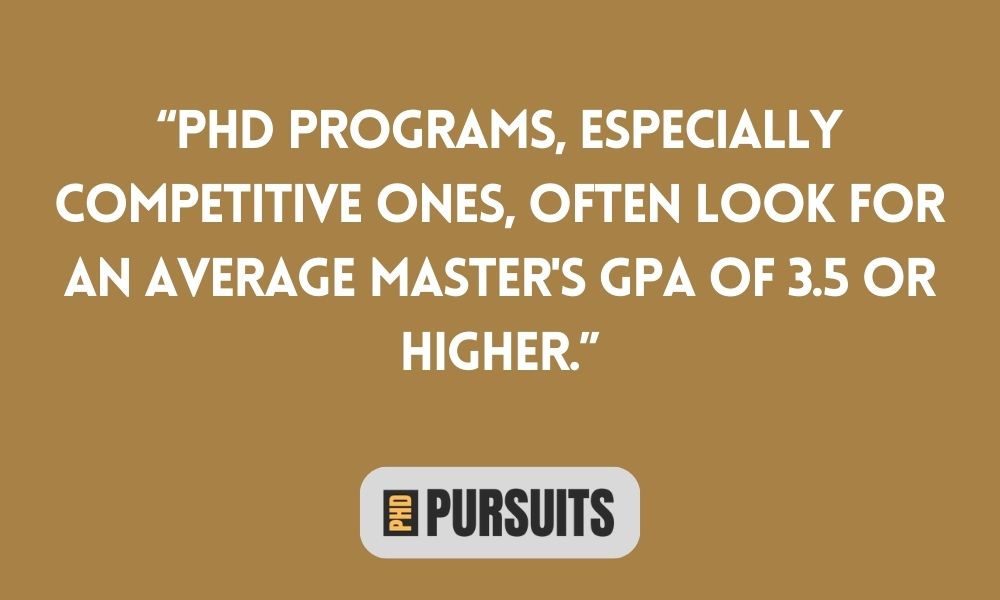
Your GPA in graduate school showcases your ability to handle advanced coursework, a key indicator for PhD programs. It’s important to understand that PhD admissions committees don’t just look at numbers. They consider your entire profile, including:
- research experience,
- GRE scores, and
- your statement of purpose.
However, the significance of GPA can differ depending on your field of study. PhD programs in education might weigh practical teaching experience more heavily than a program focused on theoretical research.
If you’re applying to a PhD program with a lower GPA, highlighting your research experience or a strong statement of purpose can offset a poor undergrad GPA.
Remember, while a high GPA is advantageous, a lower graduate GPA doesn’t automatically disqualify you. Many programs require a minimum GPA of 3.0, but if yours is slightly below, compensate with strong research credentials or recommendations from professors at the same school.
Each program you are applying to may have different expectations. Some doctoral degree programs have a high minimum GPA requirement, while others may be more flexible.
Make sure you research the specific requirements of the programs you’re interested in.
Factors Influencing Your GPA In Grad School
Navigating grad school is a unique journey where your GPA becomes a reflection of more than just test scores. It’s influenced by a tapestry of factors, each playing its part in the academic saga.
- Course Selection: Opting for a mix that balances your strengths with necessary challenges can help maintain a strong GPA. Remember, a well-chosen elective can boost your GPA just as a core course can test it.
- Time Management: Grad school is demanding, with research, internships, and coursework all clamoring for your attention. Effective time management can mean the difference between a good GPA and a great one.
- Your Professors: Their roles can’t be understated. Building a rapport with them can provide insights and guidance not just for coursework, but for navigating the academic landscape of your field. Their support can be invaluable, especially when you’re pursuing a PhD.
- Your academic background: A solid foundation from your undergrad days sets the stage, but gaps in knowledge can be challenging. It’s not just about a high undergrad GPA but understanding the core concepts that will be built upon.
- Culture And Expectations Of Your Specific Program: influence your GPA. Some programs have a reputation for grade inflation, while others are known for their rigor. Understanding these nuances can help you set realistic goals and strategies for success.
In grad school, your GPA is a tapestry woven from these varied threads. It’s not just a number but a narrative of your academic journey, unique to each student.
Do Masters GPA Matter A Lot To PhD Admission Committees?
Your master’s GPA is more than just a number; it’s a key that can unlock the door to your desired PhD program. Here’s why admissions committees weigh it heavily.
Reflects Your Academic Abilities
Your GPA reflects your academic abilities in a graduate-level setting. It’s one thing to excel in undergrad courses, but grad school demands a higher level of understanding and critical thinking.
A strong master’s GPA suggests you’re up for the challenge of a PhD program. Masters level study usually are closer to PhD than undergraduate, which means the earlier to reflect your potential performance in PhD better.
Showcases Your Consistency and Dedication
A high GPA in grad school showcases your consistency and dedication. PhD programs are rigorous and require sustained effort – more like a marathon than a sprint.
If you’ve maintained a high GPA throughout your master’s, it signals to the admissions committee that you have the work ethic and stamina needed for the long haul of a doctoral program.
Potential In Research
Your GPA can be a proxy for your potential in research. Many PhD programs involve extensive research, and a good masters GPA indicates you’ve successfully done some research, and navigated this aspect.
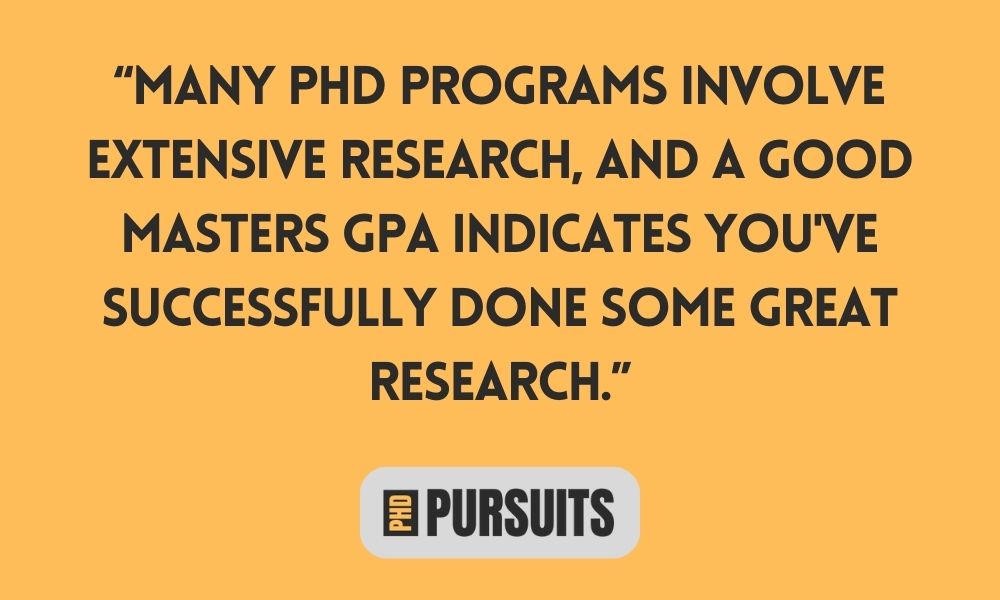
It’s not just about grades; it’s about demonstrating your ability to contribute to your field of study. If you can do so well at masters’ level, you should be able to perform at a higher level during your PhD studies.
Helps To Differentiate Candidates
Grad school GPAs help differentiate candidates in competitive fields. When many applicants have strong GRE scores and research experience, a high master’s GPA can set you apart. It becomes a critical factor in deciding who gets the limited spots.
In cases where undergrad performance is less than stellar, a strong master’s GPA can turn the tide. It shows growth and the ability to overcome past academic hurdles.
Admissions committees recognize this resilience, often viewing a strong graduate GPA as evidence of a candidate’s true potential, despite a lower undergrad GPA.
Aside From Good GPA, What Else Is Important For Graduate School?
When applying to a PhD program, there’s more to the process than meets the eye. While a good GPA can open doors, it’s not the sole factor admissions committees weigh.
Beyond the numbers, your application tells a story, and here are some other factors that matter just as much when you apply for PhD :
Research experience
Research experience stands out as a critical element. For graduate programs, especially those in academia, the ability to conduct research is paramount.
This isn’t just about assisting in a lab or completing a project; it’s about demonstrating a genuine contribution to your field of study.
If you have:
- published papers,
- presented at conferences, or
- worked as research assistants
these experiences can significantly offset a lower GPA by showing your potential as a researcher.
Statement Of Purpose
Your statement of purpose is another game-changer. This isn’t merely an essay; it’s your voice in the admissions process. A compelling statement can set you apart by weaving your:
- past experiences,
- future goals, and
- the reasons for choosing the specific program into a coherent narrative.
Admissions committees look for candidates who not only fit academically but also align with the program’s research focus and culture.
Letters of recommendation
This can carry considerable weight. Unlike a GPA, which reflects your academic abilities broadly, recommendations provide a nuanced view of:
- your character,
- work ethic, and
- potential as a PhD student.
Choose recommenders who know you well and can speak to your abilities in a detailed, personalized manner. Often, a glowing recommendation from a respected professor can make up for a less-than-ideal GPA.

Work & Research Experience
Relevant work or professional experience can also play a vital role, especially for programs that value practical skills alongside academic prowess.
This is particularly true in fields where industry experience can inform and enhance research work.
Such experience not only demonstrates your ability to apply knowledge in real-world settings but also indicates maturity and time management skills.
An Upward Academic Trajectory
Your overall academic trajectory can impact your application. A rising trend in your grades through your undergrad or a strong master’s GPA can demonstrate growth and the ability to overcome challenges.
Programs may require a minimum GPA, but a demonstrated improvement over time or excellence in your specific field of study can speak volumes about your readiness for doctoral-level work.
How Do I Get Into A PhD Program With A Low GPA?
Getting into a PhD program with a low GPA might seem daunting, but it’s not impossible. Graduate programs understand that a GPA is just one aspect of your academic profile. If your masters GPA falls short, focusing on other areas can significantly offset this.
Research experience is gold in academia, especially for PhD admissions. Dive into projects, publish your findings, and work closely with professors.
This hands-on experience in your field of study can set you apart and demonstrate your commitment and potential as a PhD student. Programs are interested in what you can bring to the table now, not just your past.
The GRE can be another opportunity to shine. A high score can help balance a lower GPA, showing that you have the critical thinking and analytical skills needed for rigorous academic work.
Don’t overlook the power of a compelling statement of purpose. This is your chance to tell your story, highlighting how your experiences, even the challenges, have prepared you for pursuing a PhD. Explain your:
- research interests,
- your professional goals, and
- why the program you are applying to is the perfect fit for you.
Lastly, building a rapport with potential advisors can make a huge difference. If a faculty member is interested in your research proposal and advocates for you, it can significantly impact the admissions committee’s decision.

Remember, PhD programs care about your potential as a researcher and scholar in your desired field, not just your masters GPA.
Understanding The PhD Requirements – Not Just Good Average GPA
A good master’s GPA for a PhD program typically ranges from 3.5 to 4.0, reflecting strong academic performance and readiness for advanced study.
However, it’s important to consider other factors such as research experience, publications, and a well-articulated statement of purpose.
Programs value a holistic view of candidates, so if you have lower GPA, mitigated it by highlighting your strengths in other areas. Always align your application to the specific requirements and values of your desired PhD program for your best chance of success.

Dr. JW Ong holds academic degrees, including a Ph.D. in Applied Linguistics from universities in New Zealand, Malaysia, and the UK. He started PhDPursuits.com as a way to share the experience he wish he would have had known before embarking on his PhD.
GPA for Grad School: Best Range for Acceptance [2024 Guide]
When graduate studies are on your mind, figuring out the right GPA for grad school is one of the first things you need to do.

Your previous college performance may play a role in determining which graduate programs are right for you. A high GPA could increase your chances of getting into a dream school, but lower stats won’t necessarily shut you out of grad studies.
Editorial Listing ShortCode:
With a strategic approach, you can select the right program and build a graduate school application that highlights your strengths.
GPA for Grad School by Program Type

A grade point average (GPA) is a measure that describes your academic performance during a course of study.
Each grade that you earn is given a numerical value, and an average is calculated. GPAs usually range from 1.0 to 4.0, with 4.0 being the highest. Your undergraduate GPA is just one of the factors that graduate schools use to determine program admission. Colleges might also consider:
- Portfolio work
- Professional experience
- Standardized test scores
If one of these aspects is a bit weak, a strong showing in another area could make up for it. For example, if your GPA is lower than the requested minimum, stellar GRE scores could prompt the admissions committee to consider you anyway.
You’ll earn another GPA while in grad school. In some fields, especially academia, your graduate GPA may factor into your employability. It can also be important if you plan to work toward a doctorate next.
As far as grad school goes, having a clear idea of what sort of GPA colleges are looking for may help you figure out which program is best for you.
Medical Schools

Getting into a medical program may involve two different GPAs. Schools will of course look at your overall GPA. For some programs, they may require a GPA of 3.8 or higher.
They might also figure your GPA for your previous science studies and use that to determine whether you’re a good med school candidate. In addition to GPA, your MCAT scores will also be considered.
Law Schools
In general, law schools like to see a GPA of 3.5 or above. More selective schools may primarily admit students with GPAs of 3.8 or higher.
LSAT scores also factor into admissions decisions. Students with lower GPAs may boost their admissions chances by performing well on the LSAT.
Other Graduate Programs

GPA requirements can vary widely among schools and programs. A GPA of 3.0 is a fairly standard minimum. Of course, some programs set the bar higher.
Other schools will admit students with lower scores, particularly if their applications reflect their potential in other ways. High standardized test scores may convince schools that you’re ready for graduate studies. A strong resume could demonstrate your real-world abilities.
Role of GPA
When you were in your undergrad program, you earned grades. Those grades were used to determine your grade point average. The GPA that you earned could impact whether you’ll get into your top program choices for a grad degree.
In graduate school, you’ll start over with a fresh GPA. Once again, your grad scores you earn could have a say in where you’ll end up after grad school. GPA scores aren’t everything when it comes to mapping out your life plans. Even still, these figures come into play time and again as you move along your academic and professional path.
Does GPA Matter for Grad School?

Yes, your undergraduate GPA is taken into account when you apply to graduate programs. Most colleges like to see at least a 2.5 or a 3.0 from master’s program applicants. Some programs set their minimums at 3.3 or higher.
The minimum GPA for a doctoral program may start at 3.3. In addition to your overall score, the classes you took might be factored in as well. For example, admissions committees might prefer an applicant who took hard math and science classes and earned a 3.5 over one who took comparatively easy courses and got a 3.7.
If your bachelors degree GPA isn’t high enough to qualify you for your top grad programs, there are steps you can take to raise your appeal.
You could enroll in a post-baccalaureate program or a masters program with less stringent admissions requirements. By doing well in those programs, you could earn a new GPA that may do a better job of showcasing your abilities.
You might also be able to rely more heavily on other parts of your admissions packet. For instance, outstanding GRE scores might offset a lower GPA.
Does GPA Matter After College?

If you’re planning to continue your education after completing your graduate program, then it’s strategic to stay on top of your GPA. The scores you earn may determine where you can enroll for a second masters degree, for post-graduate work, or for a doctoral program.
Some employers, especially those related to academia, may take GPA scores into account. Universities may evaluate your graduate GPA and your research endeavors to determine whether you’d make a good professor.
Other employers may look at your graduate school GPA as well, but some may put more stock in your hands-on experiences, such as internships. Mentors in your field can provide insight into how much GPA matters for your specific line of work.
What’s Considered a Good GPA?

“Good” is a pretty subjective term. A GPA that places you a cut above at one school may position you solidly in the middle of the pack at another. Even still, there are some general GPA guidelines that may help you figure out whether you’d be considered a strong candidate for most graduate programs.
First of all, top scores are highly valued. Having a 4.0 may help your application stand out, no matter where you apply. Other than that, graduate school GPA requirements can vary significantly. Some programs set the minimum score for applicants at 3.5. Others go as low as 2.5. As a general rule of thumb, most colleges like to see at least a 3.0 GPA.
Schools will typically state their minimum GPA requirements. If you want a better idea of what types of schools to look for, various characteristics of the college may give you clues.
To help you with this evaluation, you can ask yourself questions like:
- Do I want a master’s degree or a doctorate? Doctoral programs often require higher GPAs than master’s programs.
- How selective is this school? Colleges with prestigious reputations may have more stringent requirements. That’s not universally true, though, and there are even top-end colleges that set no minimum GPA stipulations.
- What field of study interests me? Medical and law schools are often known for having some of the highest GPA requirements.
Luckily, you don’t have to figure this out all on your own. Most colleges publish facts and figures about their incoming classes’ GPAs. It can be helpful to check out this data before applying. That way, you can get a better idea of how a school’s stated GPA requirement matches up with its actual admissions practices.
Another thing to note is that some colleges not only look at your overall GPA but also consider how difficult your classes were. They may also figure in your GPA from select departments, such as your math scores or your grades in your major classes. Schools may also check to see what scores you earned during your junior and senior years.
How to Get into Grad School with a Low GPA

Your GPA can have an impact on whether you’ll get into the grad school of your dreams, but it’s not the only factor that most schools will consider.
If you can prove that you have what it takes to succeed at graduate studies in other ways, then you may manage to score admission to your chosen programs. You might make your case with:
- GRE or other exam scores . Colleges want to know that you can learn complicated subject matter, tackle hard assignments, and stick with a grad program. In part, that’s what the GRE and other grad school tests are for. Schools often figure that you’ll do well in a graduate program if you get high marks on one of these tests.
- Industry certifications . Perhaps you’ve earned industry certifications. Often, becoming certified requires taking courses, studying materials, and passing tests. Some grad programs may look favorably upon prestigious industry credentials.
- Personal essay . If you write a personal essay for the admissions process, you can have the opportunity to explain your poor undergraduate performance and to put forth your plan for doing better in grad school. If the admissions committee sees that you have a clear goal for grad studies, they may be convinced that you’ll be driven to succeed.
- Portfolio . You may have a portfolio that showcases some of the work in which you’ve been involved. For certain programs, admissions committees may review your portfolio materials during the admissions process. If they like what they see, it can help your case.
- Professional references . Your supervisors, whether past or present, may be able to testify to your drive and work ethic. If they write you glowing references, that can contribute to a strong application packet.
- Work experience . A lot may have changed since you were last in school. Your professional efforts may demonstrate that you’re ready to buckle down and work. Your resume may include impressive positions that you’ve held or major projects in which you’ve been involved. Those might look good to an admissions committee.
If you do get accepted to grad school with a low GPA score, it may be on a provisional basis. After you prove yourself in your first few classes, you might receive full acceptance to the program.
Typical Grad School Admissions Requirements

GPA scores are just one portion of the admissions process for graduate students. Most admissions committees will review a variety of materials to determine whether you’d be a good fit.
Here are some common materials you may need to send in:
- Personal statement . In a short essay, you can write about your past experiences or future plans.
- References . Letters of recommendation from your work supervisors may convince the admissions committee that you’d be a good addition to the program.
- Resume . A curriculum vitae or a resume may highlight your relevant career milestones.
- Test scores (if required) . Although the GRE is commonly used for grad school admissions, many schools are relaxing their rules about the need for standardized tests.
- Transcripts . Official transcripts from previous college programs will show your GPA as well as what classes you’ve taken.
Admissions policies can vary greatly, so it’s beneficial to review all requirements carefully. For example, more and more, there are grad schools that don’t require the GRE for graduate school applications.
How Important Is GPA in College?
While you’re in school, your GPA can make all the difference in your success. If your score drops too low, you might be removed from your program, or you might not be able to graduate. A low GPA may also end your eligibility for financial aid or scholarship programs.
Many schools put students on academic probation when their GPAs start to falter. While disheartening, getting put on probation may provide the motivation you need to turn things around.
Is a 3.7 GPA Good for Grad School?
Yes, a 3.7 is typically considered a strong GPA for grad school admissions. While each school sets its own policies, most programs will at least review the applications of students with a 3.7 GPA.
Some highly competitive colleges may have incoming classes in which the students’ average GPA is higher, but that doesn’t mean that a 3.7 would rule you out. It might just serve as a reminder that you’ll need other impressive elements for your application as well. As a general rule, though, having a 3.7 GPA does help students get into grad school.
Is a 3.4 GPA Good for Grad School?

Typically, a 3.4 is a pretty good GPA for masters program admission. It’s not a guarantee that you’ll get into your program of choice, but it’s often enough to qualify for sending in an application.
Some fields of study are more competitive than others, though. There are individual colleges with particularly stringent admissions guidelines that may require a higher GPA. All in all, there are plenty of fields of study and colleges for which a 3.4 is more than sufficient.
Can I Get into Grad School with a 3.2 GPA?

Grad school GPA requirements often start at 3.0. In those cases, you would make the cutoff with a 3.2. Your grades wouldn’t guarantee admission, but they’d at least qualify you to apply.
There’s stiff competition for admissions at some colleges, though. Such schools may set the GPA bar higher than a 3.2. Although they’ll likely still take your application, they may give priority to applicants with higher scores.
Of course, your GPA is only one piece of the admissions puzzle. If you have an impressive professional track record or great GRE scores, a 3.2 GPA may be more than enough to carry you.
Can Work Experience Make Up for Not Having a High Grade Point Average?

Yes, work experience is usually one of the factors that admissions committees consider when deciding which students to admit to their graduate programs. It may not rank as high as GPAs, but work experience can still be quite influential.
Your work experience can be demonstrated in a variety of ways. For example, a resume that shows how much time you’ve spent in the field could be beneficial. Personal recommendation letters, a noteworthy portfolio, or industry credentials could help as well.
Is a Student’s Major Considered When Graduate Schools Look at GPA?
Schools may pay attention to your college major, but they don’t usually weigh your GPA based on that information.
Students often apply to graduate programs in fields that are similar to their earlier studies. If the majority of applicants come from the same general field, then there’s not much value in adjusting GPA results based on major.
Even still, some schools will consider how hard your first college program was. For competitive programs, a slate of advanced math and science courses may give you a slight edge.

What If I Don’t Have a 3.0 for Grad School?

Many admissions committees will evaluate your overall readiness for grad school rather than writing you off because of a low GPA. You can also look for colleges with no GPA minimum or a 2.5 threshold.
Believe it or not, you can get into grad school with a 2.5 GPA if you can you demonstrate that your grades got better in your last two years of school. Some colleges are willing to forgive a rough start to higher education if you improved as time went on.
Your professional track record can also serve as a testimony to your abilities. For some programs, impressive work achievements or letters of reference from supervisors may be more influential than your GPA.
What’s the Difference Between a Weighted vs. Unweighted GPA?
As you check out schools’ admissions policies, you may come across two different GPA terms: weighted and unweighted. Here’s how they compare:
Grad schools typically take into account weighted versus unweighted when comparing two applicants’ GPAs.
What’s the Difference Between a Major GPA vs. Overall GPA?
While your overall GPA might be the first thing that grad schools notice about you, your major GPA might make a difference for your admissions chances as well.
An overall GPA is also known as a cumulative GPA.
Closing Thoughts

There’s no hard and fast rule about what GPA you’ll need for grad school admissions. While higher is often better, it’s not the only thing that counts in the admissions process.
If you have not taken the GRE, or if your scores were not as high as you would like, keep in mind that there is a growing number of universities that don’t require the GRE for admission decisions.
Many students who started with shaky academic track records have gone on to find success in grad school. If you can prove your readiness through test scores or professional experience, you may be able to count yourself among that group.
If you hope that grad school is in your future, you may want to take a look at accredited colleges to see which ones offer the best opportunities for you.


PhD Admission Guide
Gain admission to your dream school, guide to phd admission.
While some students swear off further education after undergrad, some love the thrill of intellectual discovery and research. For these students, graduate school is a natural choice. Graduate degrees are separated into “professional” and “academic” categories. Professional degrees are JDs and MDs, while academic degrees are PhDs (literally “Doctorates of Philosophy” regardless of what field you actually study).
Whether or not you need to pursue a PhD depends entirely on what career you wish to have. Some require higher education, while many others do not. In this guide we’ll go over how to apply to PhD programs, what they are looking for, and how the application process works. This guide is focused on the US and Canada; Europe has a system which is simultaneously similar and very different.
What PhD Programs Look For
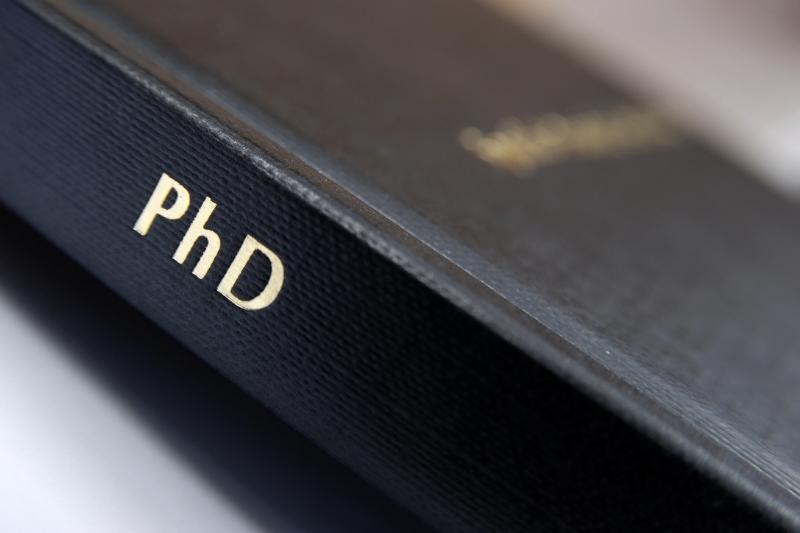
PhD programs want to make sure you are prepared academically for the rigors of the program, and that you have a concrete research goal in mind. PhD programs culminate with each student answering a research question they devise, contributing new knowledge to the world in the process.
Thus these programs seek to evaluate your intellectual ability, research goals, previous research experience, and how you will contribute to their program. To determine this, they ask for the following:
Letters of Recommendation
We’ll go through each of these in turn, and explain what graduate programs are looking for from each.
Your GPA in undergrad is the single most important factor in PhD admissions. If your GPA is too low your application will be dismissed out of hand. While there are no hard limits, we suggest a minimum GPA of 3.5 for serious contention, especially at top schools. If your GPA is below 3.0 then you will likely not get admitted into any PhD programs.
The reason for this is that PhD programs are a lot of work. Being intelligent is necessary, but is far from sufficient alone. Everyone in PhD programs is intelligent, and everyone is also willing to do the work. Your GPA is seen as the primary indicator of your willingness and ability to do academic work to a high standard, and your preparation for the rigors of a PhD program.
Along with your overall GPA, schools request your major GPA. This is your GPA when calculated only using courses in your major. This is usually expected to be higher than your overall GPA. Your major GPA should be over 3.5.
While taking harder courses in undergrad is a great experience, they can also harm your overall GPA. Of course, the best approach is to take very hard classes and do well in them, but this is not always possible. We recommend taking a blend of courses, so you are never overloaded, and able to give each the attention it needs to do well.
Academic Preparation
Your GPA and transcript is also used to judge your academic preparation for the program. You should have a solid grounding in the field, and have taken advanced courses as well. Taking graduate level courses in undergrad can exemplify this.
Some PhD programs also require research languages. This is more common in the social sciences and humanities, but all students will benefit from knowing other languages well enough to do research in them. You should look up language requirements when researching programs to apply to.
The Graduate Record Examinations (GRE) is a standardized test meant for students who intend to apply to graduate programs. Both MA and PhD programs ask for GRE scores. Much like the SAT or ACT in college exams, the test is meant to be a standardized measure of academic preparation and logical skill.
The test consists of six sections. The first is writing, next are two on verbal reasoning, then two on quantitative reasoning, and finally a research or experimental section, meant to test new questions. The entire test is offered on the computer, with one minute breaks after each section, and a ten minute break after the third section. While there is also a paper-based test, almost all testing is now done on a computer. Due to the pandemic, both testing centers and at-home testing are offered. The GRE is a multi-stage test, and how well you do on earlier sections determines the difficulty of later sections and questions.
The verbal sections each consist of 20 questions, to be answered over 30 minutes. The whole is scored on a scale of 130-170. The quantitative section is scored the same, and consists of two 20 question sections, each of which should be completed in 35 minutes. The writing section is scored from 0-6. For this section, you write an essay on a given issue in 30 minutes, and offer a response critiquing a provided argument for 30 minutes.
Your total score from the GRE is given from 130-170. While the exact scores you need to enter graduate school vary, higher is better. In addition, some programs only care about your verbal score, while others only care about your quantitative score. How much weight each program puts on GRE scores varies greatly.
We recommend studying for the GRE for some time before testing. You can take the GRE up to five times per year, but must wait at least 21 days between testing dates. Only scores from the past 5 years will be released or considered by graduate programs.
Curriculum Vitae
This is akin to a resume, but is dissimilar enough that the two cannot be used interchangeably. The purpose of a CV is, like a resume, to detail what you have accomplished academically and in your career. It is far more focused on academics however, and is widely used for academic careers.
We recommend finding a template for a CV online, or asking your college’s advisors for help in creating one. If you already have a resume, then you will easily be able to convert it into a CV.
What admissions officers are looking for in your activities is primarily signs of research. This should be in whatever field you intend to pursue a PhD in. Publications are also incredibly valuable. All of academia runs on publication, and getting an early start helps your career at every step.
You should try to do research while still in undergrad. What this looks like depends entirely on what field you are pursuing. While the research does not have to exactly line up with what you wish to pursue, it should teach you skills which are cross applicable. Higher level academic research has its own set of methods and language which must be learned, and students who are already familiar with the forms and structures of research have a leg up in graduate school.
Publication is not required, but is nice to see. If you have completed a master’s degree, you should have some publication history; of your thesis if nothing else. Speak with your academic advisors about getting your work published.
Each graduate school you apply to will ask for an essay. You will be able to use the same basic form for each, but will need to edit it to be about the particular program you are applying to. Most schools only require a single essay, although some programs ask for a second on diversity.
The purpose of this essay is to explain your research interests, what you have studied, your intended area of specialization, and what your focus will be on. Every PhD student is asking and trying to answer a very specific research question. This question forms the basis of their dissertation, and will be the focus of your life for several years if you are accepted.
Thus the essay is the most important part of your application. Your grades and GRE are required to see if you are academically ready for graduate school, but the essay lets readers know if you are a match for their program, and serious about your research.
Your essay should begin by stating which program you are applying to, and why. Next, go through your previous academic experience in the field, both coursework and research. You don’t have to go through every class, but cover the ones most relevant to your desired research topic.
You should discuss any prior research you have done in the field. If you completed a thesis for your undergraduate degree or a master’s program, cover that here. If you have any publication credits, cover those as well. This should relate directly to the field you are trying to enter. If you wish to pursue lab work, discuss your previous experiences; if instead you are pursuing field work, talk about your experiences there.
Next you should talk about the research you specifically wish to pursue through a PhD. You don’t need to have an exact research question worked out, but it is helpful to have some idea; you should at least know the subfield you will be focusing on. The more specific you are, the better. Having some discussion of methodology can be nice, but is not always necessary.
If there are any ongoing research projects ongoing at the school you wish to work on, cover those next. You should discuss how these projects specifically relate to your own research interests. Finally, you should talk about which professors you wish to work with. Professors take on graduate students to advise, and you ideally want one with a specialization at least tangentially related to your field of interest. The more closely related the professor’s studies are to your own, the better.
You will be able to leave much of this essay the same for each school you apply to, changing only the name of the program, the research projects, and the professors you wish to work with.
This essay should be a page and a half to two pages long, single spaced. You should go into sufficient detail for those reading it to understand the research you want to pursue. These essays are reviewed by the faculty who run the department, and they make the admissions decisions for PhD programs. There are many more applicants than there are spaces, and admissions rates are low. The more specific and detailed you are in this essay, the better the faculty will understand your research aims, and the better your chances will be.
Diversity Statements
Not all programs ask for these, but you will likely be able to reuse the same essay for those that do. The purpose of the diversity statement is to see what unique points of view and experiences you will be able to contribute to the program. PhDs are about learning, and the more viewpoints and ideas within a program, the broader the experience will be.
If you are a member of an underrepresented group, an immigrant, come from an underprivileged background, or come from an area which is generally underrepresented, we suggest discussing that in this essay. You should not write an essay about your interactions with members of these groups, or a study abroad experience.
Above all, this essay should be authentic to you and your experience. The goal is to show how your background has shaped you as a person, and how it impacts your view of the world.
As with college applications, letters of recommendation are required for PhD admissions. These tell admissions committees who you are as a student and researcher, and give their opinion on how you will perform when doing graduate level work. Academic fields are small and often insular, and the professors writing your letters will often be known by those reading them, either by reputation or in person.
Programs ask for two to four letters. These should primarily come from professors who know you and your work well. If you had a thesis advisor, they should write one of your letters. If you’ve worked doing research for some time, then a mentor or lab director can also be a good source of a letter, even if they haven’t taught you in class. Letters should not come from non-academic sources, unless you have worked professionally in that field.
While you have the option to read the letters that are written for you, you should always waive that right. If you don’t trust your writers to craft good letters for you, then you shouldn’t be asking them for letters. Asking to see letters is considered a sign of lack of trust, and is gauche. Many professors will decline to write letters if you insist on seeing them.
You should ask for letters well in advance of when they are due; we recommend at least a month or two. If you are asking non-tenured faculty for a letter, more leeway is recommended, as they have more on their plate, and are often more stressed. You may need to send a reminder as deadlines approach. You should also share a copy of your essay with letter writers, so they know exactly what subfield you intend to pursue, and can discuss this in their letters.
Finally, you should be aware of politics when asking for letters. Some professors do not like each other at all. If you are seen as the protege of a professor who others detest, this can impact your admissions chances. Always discuss which schools and programs you are applying to with your letter writers. You should also discuss your choices of writers with an advisor (for example a thesis advisor) familiar with the field. Academic politics are incredibly petty, but if you plan to pursue a PhD you need to be aware of the game, and how it is played.

If your application passes the first review, you will be invited to do an interview. This will be with faculty in the program you are applying to. This is to further get to know you, and to understand your research objectives.
You should be able to clearly explain what you want to research, and how this program will help you do so. The people talking to you will all be familiar with the field, though not necessarily your specific subfield. They are looking for your ability to communicate and explain your view. Be prepared to answer some questions about the specifics of your goals, though it’s ok if you don’t know everything right now.
Interviews are generally in person, though due to the pandemic, virtual interviews have become more common. This is also your chance to ask any questions you have about the program you were unable to find answers to online. You can practice for this interview with an advisor or mentor; many schools have career centers which hold mock grad school interviews as well.
When and How to Apply to Grad School
There is no unified platform for PhD applications. Instead you must apply to each program individually, through the school’s website. This will mean filling out information multiple times, but they fortunately don’t ask for much. Once you have your documents in order, the rest is personal, demographic, and contact information.
You will need to pay to have your GRE scores sent to each school you apply to. Even though this is all electronic, they still charge dearly for it.
Applications are generally due in December or January, with interviews held over the next few months. Applications open in September or October. We recommend getting your applications in before the due date, though most programs don’t use rolling admissions. Each program sets their own deadlines, so you should track when each of your applications is due carefully to make sure nothing gets overlooked.
Paying for Grad School
PhD programs are for the most part fully funded. This means you will not be paying tuition, and will also get funding to live on. This funding is generally contingent on academic standing, and doing work TAing, teaching, or on ongoing research projects (or most commonly, all of the above). Many grad students also work full or part time to support themselves.
While you will not need to take on additional debt to pay for graduate school, you will not be well paid either. While the exact amount graduate students receive varies by school and program, it is generally in the range of $20-30,000 annually. This goes towards food, housing, and supplies.
While you are in a PhD program, you will not have to make payments on any government loans you took out to pay for undergrad, though they will continue to accrue interest. Making payments on them during grad school is difficult, but will greatly cut down on the amount you need to pay back later.
There are also outside scholarships available to help pay for graduate studies. While the amounts offered by these vary, most are small. They can help greatly with paying for the necessities however, and applying to them is usually worth the time investment.
Grad School Admission FAQ
Now we’ll answer some of the most common questions about applying to PhD programs.
Can older students apply?
Yes. Many professionals return to school for a PhD long out of undergrad. We suggest taking some courses at a local university in the field you plan on entering before you do this however. Academic research advances quickly, and this will familiarize you with the latest developments. Further, this will introduce you to professors who can provide you with letters of recommendation.
What are my odds of acceptance?
This depends on both your field and program. Generally, however, it is quite difficult to gain admissions to a PhD program, and admission rates hover around 10%. Only the best students get accepted, and this is even more the case at the top schools and programs.
When should I start thinking about applications?
When you choose your major, you should decide what level you want to reach within that field. Some majors lend themselves to PhDs if you want to work in that field, while others allow employment at various levels.
Where should I apply?
You should find programs with professors who are dedicated to your particular subfield. A prestigious institution which does not focus on your area is far less useful, regardless of how famous its name is. You are looking for someone who will be able to advise you, and help you perform worthwhile research. Further, professors are looking for students studying fields similar to their own when they admit graduate students.
How long are PhD programs?
Generally programs last 4-5 years, though this can vary based on field. The exact structure of the programs also varies a lot based on field and program.

Ivy Scholars is the leading educational consultant in Sugar Land, Texas, providing admissions coaching, test prep, and more to help students enroll at top tier schools.

Get In Touch
Call us now: (281) 215-5148
Houston: 4265 San Felipe St, Suite 1100, Houston, TX 77027
Get Started
Subscribe for updates, © all rights reserved.

- be_ixf; php_sdk; php_sdk_1.4.9
- iy_2024; im_04; id_23; ih_19; imh_23; i_epoch:1713925401200
- ixf-compiler; ixf-compiler_1.0.0.0
- py_2024; pm_04; pd_08; ph_19; pmh_31; p_epoch:1712629864017
- link-block; link-block_link-block; bodystr
- pn_tstr:Mon Apr 08 19:31:04 PST 2024; pn_epoch:1712629864017
Popular Searches
- Academic Calendar
- Course Schedule
- Admitted Students
- Current Students
- Alumni and Friends
- Faculty and Staff
- Event Planning
Home » Blog » Does Graduate School GPA Matter?
Does Graduate School GPA Matter?
GRADUATE STUDIES | 3 MIN READ

The short answer is that, yes, your graduate school GPA matters.
But, of course, there’s a lot more nuance to it than that. Grades do lose some importance as you continue on your academic path. Colleges pick apart high school grades; graduate schools examine undergraduate transcripts. However, depending on your post-grad plans, your graduate school GPA could range from a pressing concern to an afterthought.
Rather than hitting a certain GPA mark, your main goal in graduate school is to develop a master’s-level understanding of your specialty and career focus. Even so, your grades will likely need to meet a higher standard than in college.
Most graduate schools require students to keep a higher grade-point average than during their undergrad years. Usually, these programs require a B (3.0) equivalent at a minimum. (Compare that with the C, or 2.0, floor that most undergraduate programs demand.)
A high GPA shows you are reasonably intelligent, are interested in your coursework and have a solid work ethic. No matter what you decide to do after graduate school—whether it’s pursuing a doctorate or another terminal degree, becoming a professor, continuing with research or finding a 9-to-5 job—those attributes will be essential.
These qualities will sell you to whoever is going to be making decisions about your next steps: an admissions officer, mentor, employer, etc.
GPA Is Just Part of Your Profile
Of course, there are other, equally important ways to convey your aptitude and tenacity outside a number. As you approach graduation, devote time to polishing up your resume, drafting cover letters, finalizing research and practicing interview skills. All those elements together will illustrate your academic performance and pull back the curtain on your future potential.
If you perform scholarly research during your graduate studies, you’ll want to collect evidence of what you did, whether it’s publications, presentations or research collaborations. Along with your GPA, these will be particularly important if you plan to continue in academia by seeking a professorship.
Some employers, too, use GPAs as indicators of job performance and potential. Not sure if you should include it on an application? If they ask, obviously, put it in. If not, talk to a contact at the organization, or a professor with experience in the field, to see if it’s expected.
The field you are entering will also make a difference. In fine arts, grades are typically less important, whereas law firms place a lot of weight on them. In business, the GPA might be part of the picture, along with the real-world experience you gained through internships or jobs during your studies. And, as with everything, it’s who you know as well as what you know.
Back to the short answer: Yes, GPAs matter. Study, work and write accordingly. But remember: A number is just a number. It’s one part of your picture.
Explore Graduate Studies at Elmhurst
Elmhurst University tailors its graduate programs to the demands of the marketplace. Discover graduate school on your terms, built around your schedule and priorities.
Request more information today!
- https://www.phdstudent.com/surviving-grad-school/transitioning-to-graduate-study/role-of-gpa-before-during-and-after-grad-school/
- https://www.nytimes.com/2012/04/15/education/edlife/do-grades-matter.html
- https://money.usnews.com/money/blogs/outside-voices-careers/articles/does-gpa-matter-when-job-searching
Illustration by Partners in Crime Posted May 4, 2021

Elmhurst University—How to Choose the Right MBA Program
January 16, 2024 | 5 Minute Read

Can You Get Financial Aid for Grad School?
September 12, 2023 | 6 Minute Read

Grad School 101: What to Consider Before Applying to Grad Schools
March 24, 2022 | 9 Minute Read

The Ultimate Guide to Grad School Letters of Recommendation
April 20, 2021 | 5 Minute Read

3 Keys for Career Success
April 6, 2021 | 6 Minute Read
Connect with #elmhurstu
PhD Admissions Frequently Asked Questions
Prospective applicants (phd).
While there are no specific prerequisite courses to complete before applying, previous experience has shown that before starting the core courses students need to have mastered the material in courses such as Stanford's Math113, Math115, Stats116, Stats200, and CS106A (or their equivalents at other universities), as demonstrated by very strong and relatively recent grades. Descriptions of these courses may be viewed on Stanford's ExploreCourses course listings pages. Where this background is missing or not recent, admission to the PhD program will involve working with the Graduate Director to design an individual program to make up the necessary courses.
No, applicants with only a bachelor's degree are eligible to enter our PhD program. Each year's admitted cohort typically comprises both students with and without a master's degree.
In light of the COVID-19 pandemic, Stanford reaffirmed its commitment to perform individualized, holistic review of each applicant to its graduate and professional programs. We recognize that students may have faced significant challenges during the period of disruption caused by the pandemic, and we will take such individual circumstances into account during application review. Importantly, we will respect decisions regarding the adoption of Credit/No Credit and other grading options during this unprecedented period of COVID-19 disruption, whether they are made by institutions or by individual students. Our goal remains to form graduate student cohorts that are excellent and encompass a diversity of perspectives, backgrounds and experiences that enrich the graduate educational experience.
No. In the Statistics Department, doctoral students select their advisor at the end of their second year in the program after having the opportunity to work on research with one or more faculty of their choosing.
No, we only matriculate students in autumn quarter and therefore all applicants must meet the annual PhD application deadline.
No. It is not possible to complete a degree online in the Statistics Department. The department offers a small number of courses online through Stanford Online , mostly in summer, but the majority of courses must be completed on campus during normal business hours.
The Bechtel International Center works with students, staff and faculty and their families on issues including immigration policy, academic and financial difficulties, transactions with foreign governments, English proficiency, housing, and adjustment to life at Stanford.
Please visit Estimated Expense Budget for information about the estimated cost of living on-campus as a graduate student (this is only an estimate; your actual expenses may differ).
Please visit Student Housing for information about campus housing at Stanford, including information on eligibility, the application process, and deadlines.
Applicants to any graduate program at Stanford are eligible to apply for this fellowship. Applicants must have applied to the Scholars program by the KHS deadline and must submit their graduate application by the dept/program deadline.
Students with a strong mathematical background who wish to go on to a PhD in Statistics should consider applying directly to the PhD program. Completing the MS in Statistics does not increase one's chances of admission to the PhD program.
No, you may apply to only one degree program per academic year. An exception is within the Biosciences, in which you may apply to up to three PhD programs within one application. However, you may apply concurrently to one departmental program and to a professional school program (law, medicine or business).
We receive approximately 200 PhD applications and usually admit 10-12 new students each year.
Graduate Exam Requirements (PhD)
The general GRE test is required of all applicants applying to a graduate program in statistics at Stanford University, including applicants who have previously attended graduate school.
No, we do not accept any tests in lieu of the GRE general test.
Admission to the Statistics Department requires the GRE general test.
Applicants who have already earned a PhD degree, or have PhD studies in progress with a degree conferral date prior to the intended start quarter, may request a GRE General Test waiver by emailing stat-admissions-PhD [at] lists.stanford.edu (stat-admissions-PhD[at]lists[dot]stanford[dot]edu) with the following information and attaching an unofficial copy of your PhD transcript: full name, institution attended, degree earned, and degree conferral date. Use the subject heading 'GRE General Test Waiver Request'.
We do not have a minimum GPA requirement for applicants to the PhD program, but GPAs of at least 3.5 are strongly recommended.
While we have not established any particular GRE test score necessary for admission, the average General GRE percentile scores of recently admitted applicants are Verbal 92%, Quantitative 94% and Analytical Writing 83%. If you submit results from more than one eligible test date we will consider the higher of the scores from each relevant test.
Effective March 2021, the GRE Math Subject Test is no longer required. Applicants to our program are now required only to take the GRE General Test. The GRE Math Subject Test will not be considered during the review of applications. GRE Math Subject Test scores submitted to Stanford University will not be made available to our department.
TOEFL (Test of English as a Foreign Language) scores are required of all applicants whose first language is not English. For detailed information, see the TOEFL information in Required Exams.
The University does not accept IELTS scores in lieu of the TOEFL.
A minimum TOEFL score of 100 on the Internet based test (iBT) is required by Stanford University for all Ph.D. applicants.
However, please note that the Graduate Admission's Required Exams webpage also states that incoming students who score below 109 on the TOEFL will likely be required to complete additional English placement testing prior to enrollment. Evidence of adequate English proficiency must be submitted before enrollment is approved by Graduate Admissions.
The average TOEFL score of Ph.D. applicants admitted to the statistics department is 112.
Yes, Stanford accepts MyBest scores, but does not accept TOEFL Essentials test scores or any other English proficiency test (e.g., IELTS, PTE).
You may request a waiver if you (will) have an equivalent degree from a recognized institution in a country other than Australia, Canada, Ireland, New Zealand, Singapore, and the United Kingdom in which English was the language of instruction. You must submit a Stanford application before submitting a TOEFL waiver request form. Note that U.S. citizenship does not automatically exempt an applicant from taking the TOEFL if the applicant’s first language is not English.
Please make sure to have your electronic scores sent to Stanford prior to their expiration date.
GRE scores are valid for five years from the test date.
TOEFL scores submitted to Stanford must be from a test taken within the last 24 months. Scores expire after two years and will not be available from ETS.
Applicants should have the Educational Testing Service (ETS) send scores electronically to Stanford.
Our university code is 4704. A department code is not required. You will either self-report your scores or indicate the date you will take the test(s) in the online application. Self-reported scores will not be considered official until Stanford receives the electronic record.
Transcripts (PhD)
Official transcripts should be submitted to the Graduate Admissions Office (not to the department) only if you have been offered admission to the program AND have accepted, and then only when they are final and show degree conferral. Final official transcripts that do not show degree conferral must be accompanied by official degree certifications. Instructions for submission are provided on the status page immediately after accepting the offer.
An official transcript must be an original document bearing the institutional seal and official signature of the Registrar or is verified by a school administrative officer or is a certified electronic transcript.
As part of the online application, applicants are required to upload scanned copies of transcripts (either official or unofficial) from all post-secondary institutions attended as a full-time student for one academic year or longer in the 'Academic History' section of the application.
If you have participated in a study abroad program or transferred courses to your home institution, and the individual courses and grades are reflected on the transcript of the home institution, then you do not need to submit separate transcripts for the study abroad/transfer institution.
Copies of your transcripts from continuing studies programs, extension schools, online courses, etc., that reflect less than one year of a full-time degree program do not need to be submitted. However, applicants may choose to include them as part of the online application under the 'Additional Information' section of the application.
Multiple page uploads are allowed for all transcripts. Do not send any official copies of transcripts (print or e-transcripts) to the department. They are not required as part of the application and will not be retained.
If the institution does not issue records in English, original language records must be submitted with official English translations. We accept translations issued by the institution or a professional translating service. Translations must be literal and complete versions of the original records. Transcripts submitted through a credentials evaluation service will also need to be accompanied by the original documents.
International students do not need to submit transcripts via an evaluation service unless your institution does not offer these documents in English.
If you are offered admission and choose to accept, you will find i nstructions provided on the status page immediately after accepting the offer.
Recommendation Letters (PhD)
The online application allows you to submit up to four letters of recommendation. Statistics PhD applicants are only required to submit three letters. It is the quality, not the quantity, of letters that supports and strengthens the graduate application. At least one recommender should be a faculty member at the last school you attended as a full-time student (unless you have been out of school for more than five years). Note: If you have concerns that one of your recommenders will not be able to submit their letter by the deadline, you may want to consider requesting letters from a total of four recommenders. This will increase the likelihood that three letters will be submitted by the deadline and that your application will be considered complete.
You should choose individuals who:
- Know you well through significant, direct involvement with you within the last three years
- Will provide detailed anecdotes and examples to support their assertions
- Are truly enthusiastic about writing a recommendation for you, will spend sufficient time writing a thoughtful letter, and will be able to submit it by the application deadline
Letters must be submitted using the electronic application. As part of the online application, the applicant will be required to register the names and contact information, including e-mail addresses, of each recommender. Recommenders will then receive an email with directions on how to proceed. For additional information, please visit the Letters of Recommendation page provided by the Office of Graduate Admissions. Letters must be received by the published deadline. It is the applicant's responsibility to ensure that letters are submitted to the electronic application by the published deadline. Do not email, mail, or fax letters of recommendation that have already been submitted through the online application.
Yes, we do accept letters submitted by your university's letter service. If this applies to you, you will still need to enter information for each recommender in the online application, including e-mail addresses which will automatically generate the email to each recommender requesting a letter. It is your responsibility to contact them to let them know to disregard this email and to use the university's letter service. Please use stat-admissions-phd [at] lists.stanford.edu (stat-admissions-PhD[at]lists[dot]stanford[dot]edu) when routing through the letter service.
The recommendation process now supports letters submitted via Interfolio. The applicant registers a recommender using an email address that contains “interfolio.com”. Please remember that letters written specifically for your Stanford graduate program tend to be stronger than letters written for general use purposes. Furthermore, the recommendation form displayed for a recommender using Interfolio will not include the evaluation questions displayed and required for other recommenders.
Your recommenders are required to submit their letters through the online application by the deadline of the round in which you apply. You are responsible for ensuring the letters are submitted on time. You will be able to see the status of each letter (either notified, started, or submitted) and you will also be able to send a reminder via the online system to any recommender who has not yet submitted as the application deadline draws near.
- Register your recommenders. Go to the “Letters of Reference” tab on the application, and enter each recommender’s information carefully. It is essential that you enter the recommender’s email address correctly so that your recommender can access the instructions and form. Read the waiver statement for each letter of reference and determine whether or not you will waive your right to review each recommendation. You cannot change this later.
- Your recommender receives an email with log in information.
- Your recommender completes and submits his/her recommendation.
- You and your recommender receive an email confirming the recommendation has been submitted.
Once you are an enrolled student , the Family Educational Rights and Privacy Act of 1974 (FERPA) provides you with a right of access to your education record, including letters of reference if they are retained by the school. The law also permits you to waive that right of access to your letters of reference if you so choose. Waiving your right of access to your letters of reference is optional; your decision to waive or retain that right will have no bearing on the handling of your application.
The recommenders whom you notify will be able to see whether or not you have waived your FERPA right of access during the letter of reference submission process. You must waive or retain your rights of access to your letters of reference (using the online application system) before you invite recommenders to submit information for you.
Application Updates, Transfers, Re-applications, Deferrals (PhD)
Yes, you may make certain updates to your application after submitting it: consult the Grad Admissions FAQs for details . Scroll down to 'Post-Submission'.
Updates made PRIOR to the application deadline will be considered part of the initial application and will be reviewed by the admissions committee. However, although the application system will still allow applicants to make some updates AFTER the deadline, there is no guarantee that the admissions committee will review them.
Applicants who indicate that they would like to be considered for the master's program in the ' Program Selection ' section of the online application are eligible to request that their application be reviewed by the MS Admissions Committee.
In order to pursue this option, applicants must submit an email request within three business days of receiving the PhD admissions decision notification. Note that it is not guaranteed that the MS Admissions Committee will accept your application for review. You will be notified via email whether your request has been approved.
Yes, you must submit a complete application, pay the application fee and submit new letters of recommendation and transcripts.
However, if your GRE and TOEFL scores (where relevant) are valid and still available in Stanford's system it may not be necessary to have them resent. Email stat-admissions-phd [at] lists.stanford.edu (stat-admissions-phd[at]lists[dot]stanford[dot]edu) for confirmation.
No. We do not allow deferral of admission. Students who are accepted but cannot enroll may reapply for a future year when they are available to begin their studies.

Graduate academic standards
Graduate academic performance standards for continued registration.
Continuing registration of graduate students is contingent upon satisfactory academic performance. It is the responsibility of the Committee on Graduate Programs (CGP) to monitor academic standards for graduate students and special graduate students in accordance with the Rules and Regulations of the Faculty .
Students should consult with their specific graduate degree program regarding grade expectations for remaining in good standing. These expectations differ among graduate programs and in general are different from those for undergraduate degree programs. A passing grade in a particular class or classes may be one of many factors a program considers in evaluating whether a student is making adequate progress in the program. Note that in most departments and graduate programs, grades consistently below B are not normally considered an acceptable measure of progress towards degree objectives. It is each department’s responsibility to inform students about academic performance requirements and expectations.
The Graduate Academic Performance Group (GAPG), under the authority of the CGP, reviews the academic records of all graduate students at the end of each term (including summer session), giving particular attention to students with cumulative ratings below 3.5 to 4.0, and students with “U” grades in thesis. Consideration is given to low grades and factors affecting a student’s ability to meet their degree program requirements.
Recommendations made by departmental graduate committees are brought to the GAPG for action. Unless extenuating circumstances are found, students who are not making satisfactory progress may be denied permission to continue or may be warned that without substantial improvement the following term they may be refused further registration. In addition, departmental graduate committees may recommend to the GAPG that a student be allowed to register only for a less advanced degree.
All such recommendations shall be brought to the Graduate Academic Performance Group by no later than the meeting during which the the relevant academic term or session is being discussed. The decision in each case shall be transmitted in writing by the Vice Chancellor to the student, the student’s department, and the Registrar.
Warnings and denials of registration approved by the GAPG and issued by the Vice Chancellor are recorded by the Registrar for Institute purposes, but are not reported on transcripts issued to other institutions and employers.
Graduate academic performance standards for federal student financial assistance
Per federal regulations, a regular graduate student is eligible to receive federal student financial assistance if the student is enrolled at least half time per term and maintains satisfactory academic progress in his or her course of study.
Federal student financial assistance for graduate students includes Teacher Education Assistance for College and Higher Education Grants, Federal Perkins Loans, Federal Direct Unsubsidized Stafford Loans, Federal Direct PLUS Loans for Graduate and Professional Degree Students, and Federal Work-Study.
To achieve satisfactory academic progress for purposes of federal student financial assistance, an MIT graduate student must achieve the following qualitative and quantitative standards:
- Have a cumulative grade point average (GPA) exceeding 4.0 on MIT’s 5.0 scale; and
- Pass 67% of cumulative credit units attempted (defined as “pace”); and
- Make satisfactory progress in his/her academic milestones, as evaluated by his/her graduate program; and
- Not exceed five terms of enrollment for a Master’s candidate and 13 for a PhD or ScD candidate.
Dropped subjects are not included in the GPA or pace calculations. Transfer credit, which carries no grade, is not included in the GPA calculation, but the number of units credited is included in the pace calculation. Incomplete grades are not included in the GPA calculation, but incomplete subjects are included in the pace calculation. Grades for repeated subjects are included in the GPA calculation, but repeated subjects count as only one subject in the pace calculation.
At the end of each term, the Graduate Academic Performance Group (GAPG) considers the academic performance of all enrolled graduate students and decides on the appropriate action for those students not making satisfactory academic performance (e.g. academic warning or denial of further registration). If a student is placed on academic warning, a set of requirements (academic plan) is set forth and communicated to the student for the student to continue to be eligible for enrollment.
Students on, or eligible for, federal student financial assistance who are placed on academic warning by GAPG are concurrently placed by Student Financial Services (SFS) on federal financial aid warning or federal financial aid probation .
- The status of federal financial aid warning is assigned to students who were not on academic warning in the prior term, but are now placed on academic warning by GAPG. Students on federal financial aid warning may continue to receive federal student financial assistance for the academic warning term. Federal financial aid warning status has no effect on the amount of financial aid a student is eligible to receive from MIT, the federal government, or any other source during the federal financial aid warning term.
- The status of federal financial aid probation is assigned to students who were on academic warning in the prior term and continue to be placed on academic warning by GAPG. Federal regulations mandate that students may only be placed on federal financial aid probation , which allows them to retain eligibility for federal financial aid, after a successful appeal. At MIT, graduate students on academic warning are encouraged to engage with and provide relevant information to their academic programs during the GAPG review of the students’ academic progress, which constitutes the required appeal process. Any decision by the GAPG other than requiring the student to withdraw from MIT constitutes a continuation of the student’s academic plan and enables students to be placed on federal financial aid probation. Federal financial aid probation status has no effect on the amount of financial aid a student is eligible to receive from MIT, the federal government, or any other source during the federal financial aid probation term.
Further information on federal satisfactory academic progress rules can be found on the SFS website .
This site uses cookies to give you the best possible experience. By browsing our website, you agree to our use of cookies.
If you require further information, please visit the Privacy Policy page.
Get started with your application to the Harvard Kenneth C. Griffin Graduate School of Arts and Sciences (Harvard Griffin GSAS)
- Dissertation
- Fellowships
- Maximizing Your Degree
- Before You Arrive
- First Weeks at Harvard
- Harvard Speak
- Pre-Arrival Resources for New International Students
- Alumni Council
- Student Engagement
- Applying to Degree Programs
- Applying to the Visiting Students Program
- Admissions Policies
- Cost of Attendance
- Express Interest
- Commencement
- Diversity & Inclusion Fellows
- Student Affinity Groups
- Recruitment and Outreach
- Find Your Financial Aid Officer
- Funding and Aid
- Financial Wellness
- Consumer Information
- Life Sciences
- Policies (Student Handbook)
- Student Center
- Title IX and Gender Equity
Welcome!
Applications to degree programs for the 2024-2025 academic year are now closed.
Click here to Access the Applicant Portal
We’re delighted that you are interested in pursuing academic studies at the Harvard Kenneth C. Griffin Graduate School of Arts and Sciences (Harvard Griffin GSAS). Whether you intend to study toward a master’s or PhD degree, join a visiting students program, or participate in one of our outreach programs, we are looking forward to reviewing your application. For information about tuition and fees, see the Cost of Attendance section.
Harvard does not discriminate on the basis of race, color, sex, sexual orientation, gender identity, religion, age, national origin, political beliefs, veteran status, or disability unrelated to job or course of study requirements, and we actively seek applicants from historically underrepresented communities. We hope you’ll consider applying.
Immigration status does not factor into decisions about admissions and financial aid. For more information, see Undocumented at Harvard .
Information for:
Exchange Scholars
Get Started
Step 1: choose a program. .
You have several options for study at Harvard Griffin GSAS.
Degree Programs
The school offers master’s and PhD degrees in programs based in the arts and humanities, social sciences, natural sciences, and engineering and applied sciences. Many programs also allow a student to conduct more focused research by choosing an area of study. Review the programs on offer to decide which program best meets your academic goals.
Are you a Harvard student looking for information on the AB/AM and AB/SM programs? Visit the Harvard AB/AM and AB/SM programs page.
Non-Degree Programs
The Visiting Students Program offers you the opportunity to take classes and conduct research with faculty.
Outreach Programs
If you are looking for a short-term research experience, consider a paid summer internship organized by Harvard Griffin GSAS, Harvard departments, and Harvard-affiliated teaching hospitals. The School also offers the Research Scholar Initiative , a post-baccalaureate program that enables college graduates to take part in a long-term research experience.
Step 2: Make a note of the application deadline and review admissions policies.
Application deadlines vary by program and are noted on the relevant program page . You should also review our admissions policies .
Step 3: Determine whether you need to take standardized tests and register early.
Degree programs may require Graduate Record Examination (GRE) general test or subject test scores. Applicants who are non-native English speakers may be required to demonstrate English proficiency by submitting scores from an English Language test (TOEFL or IELTS). Review the admissions policy on English proficiency for more information.
Step 4: Complete your application by the deadline.
The degree program application becomes available in September. You should review Completing Your Application before starting your application. All components of the application to a degree program are due by 5:00 p.m., Eastern Time, on the deadline date.
Applications for the Visiting Students Program are accepted twice a year.
For application information about our Outreach Programs , visit your program page of interest.
Who should I contact if I have a question about a specific program?
If you still have questions after carefully reviewing your degree program of interest, reach out to the contact noted on the program’s page.
Can I enroll in courses instead of applying to a degree program?
If you are interested in taking courses for academic credit outside of a formal degree program, you may apply for Visiting Student status by the appropriate deadline. Please visit the website or contact [email protected] to learn more.
Harvard Integrated Life Sciences (HILS) Applicants
While prospective degree program applicants are encouraged to carefully choose the HILS program that best fits their academic goals, interested applicants may apply to up to three programs and pay only one application fee. If you elect to apply to three programs, only two may be programs in the Department of Medical Sciences (these programs are biomedical informatics, biological and biomedical sciences, immunology, neuroscience, speech and hearing bioscience and technology, and virology). The fee waiver for additional applications is ONLY available for those applying to multiple programs in the HILS federation. For more information, please consult the HILS page . See Completing Your Application for information about fee waivers related to financial hardship.
Share this page
Explore events.
General Requirements Applying to All MS and PHD Students
Registration, satisfactory academic progress, credit restrictions, credit loads.
All students in the MS and PhD programs must register for ECE 500 or another acceptable Professional Development seminar course each semester. A suitable substitution for ECE 500 is ENG 591 ‘Engineering Advanced Seminar’. If enrolled in ECE 500, students must attend at least three seminars each semester to receive a ‘Satisfactory’ result in the class. If students choose to enroll in a Professional Development seminar class other than ECE 500, students must attend the prescribed number of classes to receive a ‘Satisfactory’ result in the class.
Unless designated as a Part-Time Student, all M.Eng Students are strongly encouraged to register for at least 12 hours of courses each semester. No registration is required for any summer courses during the M.Eng Degree.
Students approaching graduation must apply for their degrees by the deadline specified on the Graduate College Calendar . The University will not know that you are ready to graduate unless you notify them. This is done online ( UI-Integrate Self-Service ) at preregistration, or by submitting the " Application for Degree " form available from the Graduate College Thesis Handbook website. Please apply if there is a reasonable chance that you will graduate, even if you are uncertain about your graduation. This application does not carry over to the next graduation date. There is no penalty if you need to re-apply. Failure to apply for a degree by the deadline may result in not receiving the degree until the next semester.
Graduate (M.Eng/MS/PhD) students must maintain an Overall Grade Point Average (GPA) of at least 3.0 to show satisfactory academic progress toward their degree. The GPA considered is the student’s ‘Overall GPA’. The GPA is computed on all courses taken for hour credit except seminar courses in which S and U grades are recorded.
A student who fails to maintain a cumulative GPA of at least 3.0 is placed on ‘Limited Status’. If the student's Overall GPA remains under 3.0 after one semester on limited status, he/she may not continue in the ECE Graduate Program, and further registration is prohibited.
A degree candidate must have an Overall GPA of at least 3.0 to receive a graduate degree. Degree candidates who have not yet completed coursework requirements are expected to earn at least 6 hours of credit (other than credit in seminar courses such as ECE 590 ) each semester. This expectation does not apply if fewer than 6 hours are needed to fulfill the coursework requirement.
Credit in courses at the 400 level that are specifically required or primarily intended for undergraduates in Electrical Engineering or Computer Engineering may not be included in the credits for a graduate degree. The courses not available for graduate credit are:
- ECE 415 , 445
- PHYCS 404, 405, 435, 436
Note: Graduate students may not use the "Credit/No Credit" option for any 400-level and 500-level courses.
A "full program of study" consists of 12 hours or more during a semester and 6 hours during an eight-week summer session. This is also the minimum credit load which must be carried in order to be certified as a full-time student (for loans, Immigration and Naturalization Service, fellowships, etc.) or to hold a tuition and fee waiver from the Graduate College. All assistants and fellows must register for a full program of study. In most cases, it is recommended that assistants satisfy the 12 hour registration requirement by registering for two courses (typically 8 hours total) plus an additional 4 hours of credit in ECE 599.
- Public Lectures
- Faculty & Staff Site >>
Requirements
Minimum admissions requirements.
Prospective graduate students must meet the following minimum requirements:
- Hold the minimum equivalent of a four-year baccalaureate degree from a regionally accredited college or university in the U.S. or its equivalent from an accredited foreign institution or a Bologna bachelor’s degree with a minimum of 180 European Credit Transfer System (ECTS) credits.
- Also acceptable: hold a Master’s degree, a doctoral degree (Ph.D., D.Phil.), or a professional degree (M.D., J.D., D.V.M., etc.) from a regionally accredited college or university in the U.S. or its equivalent from an accredited foreign institution.
- After accepting an offer: all students confirming enrollment must provide an official (sealed) transcript and degree statement (with date of award & title of degree awarded) for verification to Graduate Enrollment Management Services (GEMS) . For more information, see Official Transcripts Requirements. Students who submit an official transcript to their admitting department are still required to submit an additional transcript to GEMS upon enrollment.
Read more about requirements on our Admissions Help and FAQs page.
- Have at least a 3.0 cumulative grade-point-average on a 4 point scale (or equivalent measures of performance if a graduate of an institution with no grading system; or equivalent grade-point-average from an accredited foreign institution) for those credits earned at the regionally accredited institution awarding the bachelor’s degree OR at least a 3.0 grade-point-average (on a 4 point scale) for the last 90 graded quarter credits or 60 graded semester credits.
- Also acceptable: have earned at least a cumulative 3.0 grade-point-average (on a 4 point scale) from an accredited institution for a Master’s, graduate doctoral degree, or professional doctoral degree.
- Graduate programs may consider an applicant with a GPA below a 3.0. Graduate programs must submit an admission petition to the Dean of the Graduate School and receive approval before an offer is made. For the complete policy, refer to Policy 3.1: Graduate Admissions .
- Some graduate programs will have additional admission requirements and may require a higher grade-point-average. These requirements can be found in the graduate program listing: select a graduate program .
English Proficiency
- Demonstration of English proficiency is required of all non-native English speakers.
- Applicants who do not meet the minimum required score will not be considered for admission. We do not offer conditional admission.
- Admitted students may be required to take additional English classes during their graduate studies, see Policy 3.2.
- Some graduate programs may require a higher score beyond the minimum required score. Additionally, some programs may not accept MyBest Scores. Please check with graduate programs to confirm their requirements: select a graduate program .
For additional ways to demonstrate English proficiency, see Policy 3.2 .
For more information, please visit our comprehensive page for International Applicants .
Citizenship and Visa Status
The Graduate School accepts applications from U.S. citizens, permanent residents (green card holders), immigrants and international applicants. Undocumented individuals are eligible for admission to any graduate program at the University of Washington. Graduate School admission requirements and application procedures are the same for all applicants regardless of citizenship and visa status.
Once an international student planning to study on an F-1 or J-1 student visa has been admitted and has accepted their offer, they must provide documentation to show proof of adequate financial support.
- Refer to our Financial Ability Requirement information
- International students must have a visa status that allows academic study at the UW. This status includes temporary U.S. visas such as F-1 student visas, J-1 exchange visitors, H-1 temporary worker, dependent visas or any other non-immigrant classifications. Students who will study on an F-1 or J-1 visa will be required to complete additional steps after confirming their intention to enroll before the Graduate School can process their visa paperwork.
- Regarding F-2 dependent visa holders, a June 2015 US immigration rule permits dependents (F-2) of international students to engage in study at SEVP-certified schools in the U.S., as long as they are enrolled in part-time study. Although the F-2s can only study part-time, that part-time study can result in the attainment of a degree. However, the F-2 would not be eligible for any employment, including on-campus, CPT, or OPT. At the University of Washington Graduate School, if an F-2 wants to enroll in a full course of academic study (10 credit minimum), they must apply for and obtain approval to change their nonimmigrant classification to F-1 or J-1. For further information on this rule, refer to the Department of Homeland Security website.
- Graduate Admissions
Application Information
The Graduate School accepts applications for designated degree and certificate programs through a secure, electronic submission process. Please see more information below regarding the application process and requirements.
Application Requirements Checklist
Application Form
Submission of the electronic application form will activate your application to the Graduate School. All hard copy documents submitted in support of the application should be submitted according to the guidelines outlined in the sections below. Start your application!
Please note that materials submitted with your application are considered final and cannot be amended once you have submitted your application. Prior to submission, changes can be made to your application. Once submitted, the application is considered final and will be reviewed as submitted. Please check your work carefully before submitting the application.
Statements of Purpose
Academic Statement of Purpose: An Academic Statement of Purpose is required for your application. Be sure to check your academic program of interest for any specific requirements regarding the statement. If there are no specific program requirements, your statement of approximately 500 words should address your intellectual interests, academic and professional objectives, and proposed topic(s) of graduate study. Please review the academic program pages for any additional guidelines for the statement of purpose.
Optional Statement (Diversity, Personal Background, and Contributions) : As Georgetown is a diverse, global community, we encourage you to upload a brief statement of up to 500 words to help the Admissions Committee understand the contribution your personal background and individual experiences would make to our community. As appropriate, you may wish to address any educational, familial, cultural, economic, and social experiences that have helped to shape your educational and professional goals; or how your background (e.g., first generation student, resident outside the U.S.) or activities (e.g., community service and leadership) will contribute to the diversity of perspectives and ideas at Georgetown University.
Transcripts, Translations, and Evaluations
Applicants are required to upload to the application copies of official transcripts from all undergraduate and graduate institutions attended where more than 15 credits of coursework have been completed or where program prerequisites have been completed (any number of credits). We consider these uploaded transcripts to be “unofficial” as they are submitted by the applicant. Transcripts from both degree and non-degree coursework provide the admissions committee a more complete picture of academic preparation for graduate study. Only transcripts that have been uploaded to the application by the student are required for the application review. Applicants who receive an offer of admission will be required at that time to submit official final transcripts (transcripts that have been submitted directly to Georgetown University by the institution) for verification prior to enrolling. Do not send electronic or paper copies of your official transcripts before receiving an offer of admission.
- Step 1: Request a copy of your official transcript from your institution.
- Step 2: Upload the transcript to your application.
An acceptable transcript is a copy of an official transcript produced by the institution. This includes:
- Scanned copies of paper transcripts issued by the institution
- Electronic transcripts issued by the institution (not a download from your institution’s web portal)
We do not accept screen shots or photos, and we do not accept downloads of the “student’s view” from your institution’s website.
- International Transcripts: Applicants who have attended institutions outside of the United States are strongly encouraged to upload their transcripts in the form of World Education Services (WES) ICAP evaluations or may utilize other credential evaluation services that are members of the National Association of Credential Evaluation Services (NACES). Applicants should upload this evaluation directly to the application. If the evaluation does not include a copy of the transcripts that were evaluated, applicants must upload both the transcripts from the institution and the credential evaluation as one document to the application. Note: Some programs require a credential evaluation (WES or similar) for international transcripts. Please review the program admission requirements to determine if a credential evaluation is required.
- For transcripts not in English: These documents must be accompanied by an English language version provided by the academic institution. If your institution does not provide English language copies, applicants are responsible for providing a certified or notarized translation along with a copy of the original transcripts. Applicants may upload an evaluation from a credential evaluation service. This must include course and grade information. If not included in the evaluation, the transcript from the institution must be included as well. Both the evaluation and original transcript should be submitted in the application as one document.
- That the translator has reviewed and translated the document with name, signature, and date included
- The completeness and accuracy of the document, and the origin country / language
- The translator’s qualifications.
- The translation and certification statement may be uploaded with the copy of the transcript in the original language.
- Study Abroad and/or Transfer Coursework: If your undergraduate transcripts contain study abroad courses and/or transfer credits showing grades earned, you do NOT need to list these institutions separately or upload transcripts. If courses are not listed on your primary institution’s transcript or the transfer courses do not show course grades, please list the institution(s) separately and upload the transcript(s).
- If an offer of admission is granted and accepted, admitted students will be required to submit final official transcripts from all institutions where a degree has been earned and other institutions as designated in their admissions letter. Additional details for which can be reviewed on our admitted students page . Georgetown University reserves the right to request any missing transcripts or an official copy of a transcript at any point during the application and/or admission process. Georgetown University also reserves the right to withdraw any offer of admission already made if there is any discrepancy between a transcript uploaded in the application and the final official transcript that is received.
Review our Transcript FAQs for additional details regarding required content, format, and submission.
Self-Reported GPA
You will be required to self-report the grade point averages (GPA) for undergraduate and graduate (if applicable) coursework in the Self-Reported GPA section of the application.
The GPA represents the combined GPA of all credits applied toward the primary degree. All applicants will provide the self-reported GPA for their primary undergraduate degree. Those who have attended a graduate program will need to calculate a second GPA for the graduate degree.
As such, please review the steps below to understand what needs to be reported and how to calculate your GPA.
What to Report and Calculate:
- All undergraduate and graduate coursework completed at the time of the submission of the application should be included in the GPA reporting.
- If you attended only one school in the U.S. and the GPA is calculated on a 4.0 scale, please report the cumulative GPA provided within your transcript.
- If you have multiple undergraduate degrees, the most relevant degree GPA should be reported.
- If you transferred more than 15 credits from one or more U.S. schools, grades from those schools should be combined to calculate the undergraduate GPA.
- If the primary undergraduate institution accepted only some of the courses taken and specifies which courses were accepted, only the grades for courses transferred should be included in the calculation.
- If fewer than 15 credits were completed at one or more U.S. institutions, even if applied to the degree, they should not be calculated towards the GPA.
- If credits were earned elsewhere but not accepted by the primary degree-granting institution, they should not be calculated towards the GPA.
Other Notes:
- Failed courses that appear on your transcript but are not included in the institution’s calculation of the GPA should be included in the calculation
- If a course was repeated, both grades should be included in the calculation.
- If you attended a U.S. school that does not calculate GPAs, or if the school does not issue standard letter grades, the GPA should be self-reported as “CBC” or “Cannot be calculated”
The following should not be included in the calculation:
- Study abroad credits
- Pass/Fail grades
- Withdraw or dropped coursework/grades
- Graduate coursework should not be included in undergraduate GPA calculation unless counted towards undergraduate degree requirements.
- 15 or fewer credits were completed at another institution, even If those credits were applied to the degree
If you have determined that you will need to calculate your GPA based upon the previous criteria, please follow the steps here to calculate your GPA.
How to Calculate Your GPA
- Download the GPA Calculation Form
- GPA must be calculated based upon a 4.0 grade scale
- If not, then you must recalculate grades using the calculation form.
- If you have attended two schools and one school uses 1 unit as a semester hour and the other school uses 3 units as a semester hour, the first school’s values should be multiplied by 3 so that the grades are given equal weight.
- If one of the schools is on the quarter system and the other is in the semester system, the credit hours are not equivalent and must be converted. One semester hour is equivalent to .667 quarters hours, and one quarter hour is equivalent to 1.5 semester hours. GPA must be calculated to the hundredth decimal point (i.e. 3.15) rounding up or down as necessary). (So, to convert semester hours into quarter hours, multiply by 1.5. To convert quarter hours into semester hours, multiply by .667)
- Determine which grading scale matches your institutions.
- Select the appropriate tab on the GPA Calculation Form and begin entering the credit hours as required.
- When completed, save the GPA Calculation Form and upload to the Self-Reported GPA section of the online application.
- An A+ should not be counted as 4.3 grade points, as Georgetown does not calculate as such. An A+, should be counted as 4 grade points.
- Failures should be calculated in the GPA
- Pass/Fail credit hours: Some institutions will include Pass/Fail credit hours in the total hours, even though they are not included in the GPA. As a consequence, you will enter the data in the spreadsheet and the resulting GPA will not match the GPA on the transcript. You should always check to see if this is the case when entering data. You can determine if P/F grade hours are included by checking the individual semester totals. Adjust the total number of credit hours as appropriate, and double-check to make sure the GPA for that school is now calculating correctly.
Official Recommendations
Three official recommendations are required by the Graduate School unless your program only mandates two. These recommendations must be from persons in positions to appraise the applicant’s potential for graduate study. Some programs have specific requirements for recommendation providers.
The Graduate School requires use of the online recommendation system, which utilizes a secure online recommendation system that will:
- email your recommendation providers with instructions for online submission of the recommendation
- allow applicants to track recommendations received or not received and follow up with recommenders who still need to submit their appraisals
- expedite the processing of the recommendations, which will be included in the online application once submitted
- automatically notify you when recommendations have been received
Official Test Results
Most departments and programs require applicants to take standardized entrance examinations, such as the GRE, GRE subject tests, GMAT, MCAT or others. Please refer to academic programs for the examinations required by individual programs. All official examination results must be:
- received by the application deadline of the graduate program to which you are applying (we recommend you take the test(s) no later than one month prior to the application deadline for the program).
- received directly from the appropriate testing organization (photocopied/faxed/scanned documents will not fulfill this requirement).
- Note: Do not upload unofficial score reports to the application. Only official scores will be reviewed by the admissions committee.
Submitting Test Scores
Official test scores should be requested and sent to the following:
- GRE Code: 5244
- TOEFL Code: 5244
- IELTS: Submit by electronic score delivery service
- McCourt School of Public Policy: JT7-D8-97
- All other programs: JT7-GJ-96
- PDF AMCAS Report
- Score Report w/ verification link
- Report scores through AMCAS
English Proficiency: TOEFL/IELTS
All applicants are required to demonstrate a level of proficiency in the English language sufficient to meet the admission requirement of the Graduate School of Arts and Sciences. Proficiency can be demonstrated by the receipt of a bachelor’s or advanced degree from an accredited institution of higher education in the United States or from a university where English is the primary language of instruction (please note that applicants receiving degrees at universities in U.S. territories, such as Puerto Rico, are required to submit the TOEFL or IELTS unless the primary language of instruction at the institution is English).
All other applicants must achieve at least a minimum score on either the TOEFL or IELTS test. Test scores must be received by the application deadline date. Applicants should allow six to eight weeks from the test date for the reporting of scores to the institution. Applications will not be considered without TOEFL/IELTS scores.
- TOEFL: A minimum score of 80 or 100, dependent on program requirements (some programs require a score of a 100), on the Test of English as a Foreign Language (TOEFL). Georgetown University’s score reporting code is: 5244. TOEFL information: http://www.ets.org/toefl/ .
- IELTS: A minimum score of 7.0 or 7.5, dependent on program requirements, from the International English Language Testing System. Electronic score reporting only. IELTS Information: http://www.ielts.org/ .
Note: Do not upload unofficial score reports to the application. Only official scores provided by the testing agency will be reviewed by the admissions committee.
Resources for International Applicants
- Visa and Immigration Documents- International applicants should not submit supporting financial and sponsorship documentation during the initial application process, but should instead wait until after an official offer of admission has been made. Soon after you confirm your enrollment, you will receive instructions to request a Certificate of Eligibility for F-1 or J-1 status (Form I-20 or Form DS-2019) from the Office of Global Services (OGS) .
- Scholarships Financial Aid- International students are eligible for institutional funds (such as assistantships, fellowships and scholarships) and for support drawn from federal and other research grants; however international students are generally not eligible for federal loan money from the United States government. For further information and resources on available funding for international students, please visit the Financial Aid for International Students page.
- EducationUSA – EducationUSA is the U.S. State Department’s network of over 400 advising centers in 170 countries around the world. These centers are designed to assist international students as they prepare to apply to and attend colleges and universities in the United States.
Supplemental Application Data
Some departments and programs require the completion of supplemental data or submission of materials such as writing samples, resumes, and language proficiency forms. Review the application requirements of your program of interest to determine if supplemental questions and/or materials are required. If so, this will be included as an additional section in the application to which may be asked to provide additional information about prior coursework, upload your resume, a writing sample, etc.
Application Fee and Submission
The application must be submitted with a non-refundable application fee. The application fee for the 2024 application cycle is $90. The fee can be paid by Visa or MasterCard only.
Check Receipt of Your Materials and Application Status
When you apply online , you have convenient access to an application status portal. You can verify your address, upload missing materials and review your application checklist to verify what application items have or have not been received. The status page is available after you submit your application and is updated as materials are received. Online recommendations are automatically updated to a status of “received” when submitted by the recommender.
Please note that your online checklist is a tool for you to see what has been received. For more detailed application requirements, please consult your individual program requirements and website .
Eligibility for Admission
Applicants for admission must meet certain eligibility requirements set by the Graduate School and the Graduate Departments and Programs. Applicants are admitted by the Dean of the Graduate School. Admitted applicants who confirm their intended enrollment with the Office of Graduate Admissions will be eligible to participate in Graduate Student Orientation and registration activities.
Admission Review and Admission Criteria
Once an application is received and processed by the Office of Graduate Admissions, the Graduate Department or Program Admissions Committee reviews the application. The length of this review varies by program. A decision recommendation is made to the Graduate School, where a final review of the application takes place. All final decisions on applications are rendered by the Dean of the Graduate School of Arts and Sciences.
Please note : The Graduate School requires that an application fee accompany any application to one of our graduate programs. We do not waive fees. Applicants will not receive a Graduate School decision on their application if the application fee is not paid.
Admission is official upon receipt of an online letter from the Dean of the Graduate School. Admission to a degree program may be granted to applicants:
- who have received a Bachelor’s degree from an accredited college or university in the United States or the equivalent from an international college or university;
- who will graduate or have graduated with an average of B or better;
- who meet the academic criteria specified by the department or program and the Graduate School.
Special Student Status
Occasionally, an applicant not meeting the above criteria may be admitted to the Graduate School as a Special Student. Applicants may not apply for Special Student Status, but may be admitted to this status at the discretion of the department or program and the Graduate School. Special Students are not admitted to a degree program and may be enrolled for no more than a single semester. They may take a maximum of six credits of graduate coursework during that semester. Consideration for admission to degree status includes meeting minimum requirements outlined in the Special Student admission letter. Special Students who desire degree status should submit an official, written request to the Graduate School before the end of the initial semester of admission. Please note that students admitted to Special Student status have limited access to resources such as financial aid and student health insurance. Please check with the appropriate offices for eligibility requirements.
Additional Policies and Resources for Applicants
Applicant responsibility.
It is the responsibility of the applicant to make certain that all admission materials are received by the designated application deadline. Neither the Graduate School nor the departments can assume the responsibility of informing the applicant about erroneous or missing materials.
All materials (original, copies, or electronic documents) submitted in support of an application become a part of Georgetown University application records and cannot be released to the student or a third party.
If application materials are forged, falsified or altered, the Graduate School will notify all relevant officials, including the individual or institution issuing the document(s) and, as appropriate, immigration officers. Submission of such materials will disqualify an applicant for admission.
Equal Opportunity Statement
Georgetown University admits qualified students of any age, sex, religion, race, sexual orientation, color, disability and/or national or ethnic origin to all rights, privileges, programs and activities generally accorded or made available to students at the school.
It does not discriminate on the basis of age, sex, religion, race, sexual orientation, color, disability and/or national or ethnic origin in administration of its educational policies, admissions policies, scholarship and loan programs, athletic and other school-administered programs.
Georgetown University is an Equal Opportunity/Affirmative Action Institution.
Students with Disabilities
The university’s Academic Resource Center is available to assist and guide students with disabilities who may need access to accommodations. Contact information:
Location: Leavey Center, Third Floor Telephone: (202) 687-8354 E-mail: [email protected]
Privacy Policy
Georgetown University’s Privacy Policy describes the University’s general approach to protecting your personal information. If you have any questions, please contact [email protected] and reference “Graduate Admissions.” Our processing of personal information provided by EU/EEA residents may also be subject to the General Data Protection Regulation (the “GDPR”). When EU/EEA residents submit information to Georgetown University or use Georgetown University’s websites and/or electronic services, they consent to the collection, use, and disclosure of that information as described in the Admissions Privacy Notice- EU .
- Guidance for International Students
- PhD/Master's Application Process

If you are an international applicant to a PhD or Master's degree program, you have the same general requirements as all other applicants.
Note: Applicants to a non-degree program, including Exchange Scholars , Visiting Assistants in Research , and Visiting Students , should visit the relevant page for information about admission to those programs.
Bachelor's Degree or International Equivalent
All entering students must have earned a bachelor's degree or its international equivalent prior to enrolling at the Graduate School. You may submit an application before receiving your degree, or while your degree is still in progress, as long as the degree will be completed prior to matriculation.
Some countries grant an undergraduate or bachelor's-equivalent degree in three years. In such cases, completion of a three-year degree will meet the application requirement.
English Language Testing (TOEFL/IELTS)
TOEFL or IELTS is required of almost all applicants whose native language is not English.
If you have received (or will receive) an undergraduate degree from a college or university where English is the primary language of instruction, you are exempt from the English Language Test requirement and are not required to submit the TOEFL or IELTS. You must have studied in residence at the undergraduate institution for at least three years to qualify. No exemptions are made on the basis of an advanced degree (e.g., MA/MS or PhD) from any institution. For more information, please see Standardized Test Requirements .
Although the Graduate School does not have test minimums for admission, individual departments may have a minimum requirement and will use these scores when they review your application. Please check with the department or program to which you are applying to see if it has a minimum requirement. The Graduate School requires incoming doctoral students who received a score of 25 or below on the TOEFL Speaking section or a 7.5 or below on the IELTS Speaking section to participate in a Summer English Language program at Yale in August prior to matriculation. These students are required to demonstrate English proficiency before they are permitted to teach.
Entry Term/Intake
All PhD and Master's students begin their studies at Yale in the fall term. No spring term entry is permitted. Application for admission to any of the Graduate School's programs begins in the summer or fall of the academic year prior to the one in which you propose to matriculate. Please submit your application by the program deadline .
Visa Questions and Processing
The Office of International Students and Scholars (OISS) serves as the immigration adviser for all entering international students and their accompanying family members. Beginning in March, OISS will contact you with the necessary visa and immigration information if you have accepted Yale's offer of admission.
GPA and GPA Conversion
You may self-report a GPA and GPA scale in the “Academic History” section of the application. Please do not convert or recalculate your GPA. If your college or university does not report or compute a GPA, you should omit it.
Translations
All academic records and letters of recommendation uploaded to your application must be in English or accompanied by an English translation.
Fee Waivers
International students are eligible to request a fee waiver .
- Utility Menu
Psychology Graduate Program
- Psychology Department
The Harvard Kenneth C. Griffin Graduate School of Arts and Sciences welcomes applications for admission from individuals who have or will have by the time of matriculation a BA, BS, or equivalent undergraduate degree (for prospective international students, a three- or four-year undergraduate degree from an institution of recognized standing) and actively seeks applicants from groups historically underrepresented in graduate schools . All degree candidates are admitted for full-time study beginning in the fall term.
Immigration status does not factor into decisions about admissions and financial aid. For more information, see Undocumented at Harvard .
If you already hold a PhD or its equivalent, or are an advanced doctoral candidate at another institution, you may apply to a PhD program only if it is in an unrelated field of study; however, preference for admissions and financial aid will be given to those who have not already had an opportunity to study for a doctoral degree at Harvard or elsewhere. You may also want to consider pursuing non-degree study through our Special Student or Visiting Fellow programs.
Eligible Harvard College students with advanced standing may apply in the fall of their junior year to earn an AM or SM degree during their final year of undergraduate study. Interested students must contact the Office of Undergraduate Education for eligibility details before applying.
Questions about the application or required materials should be directed to the Harvard Griffin GSAS Admissions Office at [email protected] or 617-496-6100.
Harvard Griffin GSAS does not discriminate against applicants or students on the basis of race, color, national origin, ancestry or any other protected classification.
Required Application Materials
Please refer to Completing Your Application on the Harvard Griffin GSAS Admissions site for details. A complete application consists of:
Online application form
Application fee payment* ($105)
Transcripts
Letters of recommendation (at least 3)
Statement of purpose
Personal statement
Demonstration of English proficiency
GRE General exam scores - o ptional but recommended for Fall 2024 admission**
Harvard Griffin GSAS may request additional academic documents, as needed.
*Application fee waivers are available to those for whom payment of the application fee would be financially challenging. Applicants can determine eligibility for a fee waiver by completing a series of questions in the Application Fee section of the application. Once these questions have been completed, the application system will provide an immediate response regarding fee waiver eligibility.
**Graduate student admissions are among the most important decisions we make as a department. Like many other PhD programs around the US and abroad, we have wrestled with the question of whether we should continue to require that applicants to our PhD program submit scores from the Graduate Record Examination (GRE) as part of their application. After extensive review of the scientific literature and robust discussion among our faculty, we have decided to continue to make submission of GRE scores optional, but to Recommend that students submit GRE scores if they are able to do so. We wanted to share our candid thoughts on this here.
A number of empirical and review papers have noted that performance on the GRE is not a strong predictor of performance on a number of graduate school metrics (e.g., correlation with graduate school GPA = .21-.31, which represent small to medium effect sizes; Woo et al., 2023) and that the fact that the significant group differences (by race/ethnicity and gender) in GRE scores suggest it may discourage those from underrepresented groups from applying to PhD programs. Other research has shown that although there are limitations to the GRE, other potential predictors of success in graduate school have even smaller correlations with such outcomes, and removing the GRE would lead us to rely on these other potentially biased factors, such as where a person received their undergraduate degree, what research lab they had the opportunity to train in, and letters of recommendation.(1) We have heard anecdotally from current and former PhD students (including those historically underrepresented in PhD programs) who argue that the GRE helped them demonstrate their abilities when they didn’t attend a top undergraduate institution or work in a well-known research lab.
On balance, we acknowledge that the GRE is an imperfect test and should not be used as the single deciding factor in admissions; however, we fear that excluding it altogether will introduce more, not less, bias into the admissions decision-making process. Thus, we have decided to keep the submission of GRE scores optional, but to recommend that students submit their scores if they are able to do so.
We know that many students might expect that we are looking for near-perfect scores as a requirement for admission. We are not. We do not use a rigid threshold for GRE scores, and take it into consideration with other factors (e.g., strong performance in undergraduate statistics might be used to demonstrate quantitative abilities in place of strong performance on the quantitative section of the GRE). To be transparent about this, we note that our past 10 years’ of admitted PhD applicants have had scores on the GRE ranging on the Quantitative section from the 38th to the 98th percentile, and on the Verbal section ranging from the 59th to the 99th percentile.(2 )
We will continue to work toward determining how to make admissions decisions in a way that identifies the candidates who match best with what our PhD training program has to offer and in doing so may make further adjustments to our admissions requirements in future admissions cycles.
(1) For a review of these issues, see: Woo, S. E., LeBreton, J. M., Keith, M. G., & Tay, L. (2023). Bias, Fairness, and Validity in Graduate-School Admissions: A Psychometric Perspective. Perspectives on Psychological Science, 18(1), 3–31. https://doi.org/10.1177/17456916211055374
(2) Note: Test scores were not required for the past 3 years and so are largely unavailable for that period.
- FAQ for Applicants
- Resources for Applicants
Inquire or Apply
Graduate School Admissions Inquiry Form
Apply Online
Course Descriptions
Numbers, Facts and Trends Shaping Your World
Read our research on:
Full Topic List
Regions & Countries
- Publications
- Our Methods
- Short Reads
- Tools & Resources
Read Our Research On:
What’s behind the growing gap between men and women in college completion?

The growing gender gap in higher education – both in enrollment and graduation rates – has been a topic of conversation and debate in recent months. Young women are more likely to be enrolled in college today than young men, and among those ages 25 and older, women are more likely than men to have a four-year college degree. The gap in college completion is even wider among younger adults ages 25 to 34.
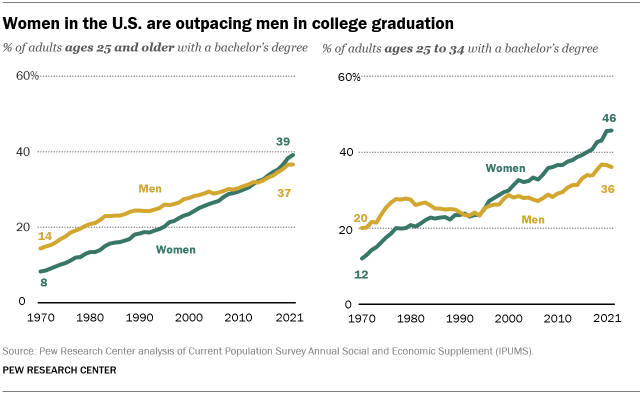
Women’s educational gains have occurred alongside their growing labor force participation as well as structural changes in the economy . The implications of the growing gap in educational attainment for men are significant, as research has shown the strong correlation between college completion and lifetime earnings and wealth accumulation .
To explore the factors contributing to the growing gender gap in college completion, we surveyed 9,676 U.S. adults between Oct. 18-24, 2021. Everyone who took part is a member of Pew Research Center’s American Trends Panel (ATP), an online survey panel that is recruited through national, random sampling of residential addresses. This way nearly all U.S. adults have a chance of selection. The survey is weighted to be representative of the U.S. adult population by gender, race, ethnicity, partisan affiliation, education and other categories. Read more about the ATP’s methodology .
Data on rates of college completion came from a Center analysis of Current Population Survey Annual Social and Economic Supplement (IPUMS). The onset of the COVID-19 pandemic impacted the data collection for the 2020 ASEC. The response rate for the March 2020 survey was about 10 percentage points lower than in preceding months. Using administrative data, Census Bureau researchers have shown that nonresponding households were less similar to respondents than in earlier years. They also generated entropy balance weights to account for this nonrandom nonresponse. The 2020 ASEC figures presented used these supplementary weights.
Here are the questions used for this report, along with responses, and its methodology .
A majority (62%) of U.S. adults ages 25 and older don’t have a four-year college degree, according to a Pew Research Center analysis of Current Population Survey data. But the reasons for not completing a four-year degree differ for men and women, according to a new Center survey of adults who do not have such a degree and are not currently enrolled in college.
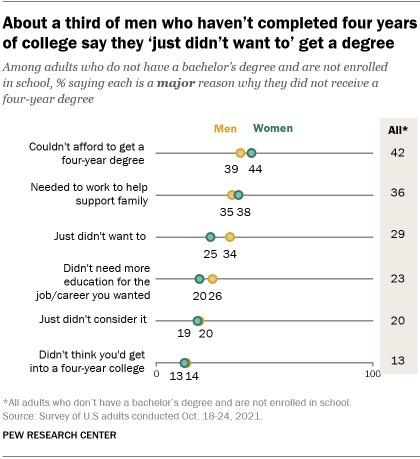
Financial considerations are a key reason why many don’t attend or complete college. Among adults who do not have a bachelor’s degree and are not currently enrolled in school, roughly four-in-ten (42%) say a major reason why they have not received a four-year college degree is that they couldn’t afford college. Some 36% say needing to work to help support their family was a major reason they didn’t get their degree.
Overall, about three-in-ten adults who didn’t complete four years of college (29%) say a major reason for this is that they just didn’t want to, 23% say they didn’t need more education for the job or career they wanted, and 20% say they just didn’t consider getting a four-year degree. Relatively few (13%) adults without a bachelor’s degree say a major reason they didn’t pursue this level of education was that they didn’t think they’d get into a four-year college.
Men are more likely than women to point to factors that have more to do with personal choice. Roughly a third (34%) of men without a bachelor’s degree say a major reason they didn’t complete college is that they just didn’t want to. Only one-in-four women say the same. Non-college-educated men are also more likely than their female counterparts to say a major reason they don’t have a four-year degree is that they didn’t need more education for the job or career they wanted (26% of men say this vs. 20% of women).
Women (44%) are more likely than men (39%) to say not being able to afford college is a major reason they don’t have a bachelor’s degree. Men and women are about equally likely to say needing to work to help support their family was a major impediment.
The shares of men and women saying they didn’t consider going to college or they didn’t think they’d get into a four-year school are not significantly different.
The reasons people give for not completing college also differ across racial and ethnic groups. Among those without a bachelor’s degree, Hispanic adults (52%) are more likely than those who are White (39%) or Black (41%) to say a major reason they didn’t graduate from a four-year college is that they couldn’t afford it. Hispanic and Black adults without a four-year degree are more likely than their White counterparts to say needing to work to support their family was a major reason. There aren’t enough Asian adults without a bachelor’s degree in the sample to analyze this group separately.
While a third of White adults without a four-year degree say not wanting to go to school was a major reason they didn’t complete a four-year degree, smaller shares of Black (22%) and Hispanic (23%) adults say the same. White adults are also more likely to say not needing more education for the job or career they wanted is a major reason why they don’t have a bachelor’s degree.
In some instances, the gender gaps in the reasons for not completing college are more pronounced among White adults than among Black or Hispanic adults. About four-in-ten White men who didn’t complete four years of college (39%) say a major reason for this is that they just didn’t want to. This compares with 27% of White women without a degree. Views on this don’t differ significantly by gender for Black or Hispanic adults.
Similarly, while three-in-ten White men without a college degree say a major reason they didn’t complete college is that they didn’t need more education for the job or career they wanted, only 24% of White women say the same. Among Black and Hispanic non-college graduates, roughly similar shares of men and women say this was a major reason.
Among college graduates, men and women have similar views on the value of their degree
Looking at those who have graduated from college, men and women are equally likely to see value in the experience. Overall, 49% of four-year college graduates say their college education was extremely useful in terms of helping them grow personally and intellectually. Roughly equal shares of men (47%) and women (50%) express this view.
Some 44% of college graduates – including 45% of men and 43% of women – say their college education was extremely useful to them in opening doors to job opportunities. A somewhat smaller share of bachelor’s degree holders (38%) say college was extremely useful in helping them develop specific skills and knowledge that could be used in the workplace (38% of men and 40% of women say this).
There are differences by age on each of these items, as younger college graduates are less likely than older ones to see value in their college education. For example, only a third of college graduates younger than 50, compared with 45% of those 50 and older, say their college experience was extremely useful in helping them develop skills and knowledge that could be used in the workplace.
Note: Here are the questions used for this report, along with responses, and its methodology .
- Education & Gender
- Educational Attainment
- Higher Education
- Hispanics/Latinos & Education

Race and LGBTQ Issues in K-12 Schools
Fewer young men are in college, especially at 4-year schools, women have gained ground in the nation’s highest-paying occupations, but still lag behind men, most americans who are familiar with title ix say it’s had a positive impact on gender equality, how the political typology groups compare, most popular.
1615 L St. NW, Suite 800 Washington, DC 20036 USA (+1) 202-419-4300 | Main (+1) 202-857-8562 | Fax (+1) 202-419-4372 | Media Inquiries
Research Topics
- Age & Generations
- Coronavirus (COVID-19)
- Economy & Work
- Family & Relationships
- Gender & LGBTQ
- Immigration & Migration
- International Affairs
- Internet & Technology
- Methodological Research
- News Habits & Media
- Non-U.S. Governments
- Other Topics
- Politics & Policy
- Race & Ethnicity
- Email Newsletters
ABOUT PEW RESEARCH CENTER Pew Research Center is a nonpartisan fact tank that informs the public about the issues, attitudes and trends shaping the world. It conducts public opinion polling, demographic research, media content analysis and other empirical social science research. Pew Research Center does not take policy positions. It is a subsidiary of The Pew Charitable Trusts .
Copyright 2024 Pew Research Center
Terms & Conditions
Privacy Policy
Cookie Settings
Reprints, Permissions & Use Policy
Biden Graduated 76th in a Class of 85 at Syracuse University College of Law in 1968?
A meme about joe biden's placement in his 1968 graduating class went viral in april 2024., jordan liles, published april 22, 2024.

About this rating
In April 2024 – just months away from the November U.S. elections – a meme was virally shared on Facebook , X and other websites showing a past photo of President Joe Biden with the words, "Graduated 76th in a Class of 85." As of this writing, it was unclear who created the meme or where it was first posted. Searches with reverse-image search tools showed few results.
One of the popular posts appeared as follows:

"Did Biden graduate 76th out of a class of 85?," a reader asked Snopes in email. "Saw it posted by a friend on Facebook today 4/19 with an image of a grad that looks kinda like him shaking hands with someone else. Both in regalia. Black & white photo."
This claim was true. Biden finished 76th academically in a class of 85 at Syracuse University College of Law in 1968. This fact was previously confirmed in decades-old reporting from The Associated Press , The New York Times , The Washington Post and others. Many of the dated reports publishing this news cited records that Biden himself released in the late 1980s.
The picture featured in the meme showed Biden with the Rev. William J. Byron, the former president of the University of Scranton. It was captured at the 1976 undergraduate commencement ceremony where Biden – then a U.S. senator – received an honorary degree and addressed students with a speech. Byron died at the age of 96 on April 9, 2024, just days before the meme went viral.
The Syracuse University College of Law Alumni Association once published a letter mentioning Biden's low placement in his graduating class. "But statistics often prove not to be the predictor of one's abilities or prospects," the letter read. "And, indeed, it was after leaving Syracuse that his life and career took off."
On this same subject, Snopes previously reported on Biden's past false claim where he said he finished in the "top half" of his class at Syracuse. That and other false claims about his past – including a plagiarism scandal – reportedly factored in to his decision to drop out of the 1988 presidential race.
Snopes contacted Syracuse University College of Law to request records regarding this matter. We will update this story if we receive any further details.
"Biden Made Tall Claims, Article Says." Charlotte Observer via The Washington Post , 21 Sept. 1987, https://www.newspapers.com/image/625387830/?terms=biden&match=1.
"Biden Urges Students to Be Engaged Citizens at 1976 Commencement." Royal News | The University of Scranton , 18 Nov. 2020, https://news.scranton.edu//articles/2020/11/news-biden.shtml.
Joseph R. Biden Jr, Class of 1968 . Syracuse University College of Law Alumni Association, https://law.syracuse.edu/wp-content/uploads/VP_Biden_Citation.pdf.
Liles, Jordan. "Did White House Announce Biden's IQ Is 187?" Snopes , 30 Jan. 2024, https://www.snopes.com//fact-check/biden-187-iq/.
"Rev. William J. Byron, S.J., The University of Scranton's 21st President Dies." Royal News | The University of Scranton , 9 Apr. 2024, https://news.scranton.edu//articles/2024/04/news-president-byron.shtml.
"Sen. Joe Biden Claimed during a Campaign Appearance in New Hampshire Last Spring That He Finished in the Top Half of His Law School Class, Although Records Indicate He Finished near the Bottom." The Associated Press , https://apnews.com/article/cd977f7ff301993f7976974ba07c5495.
"The Candidates For Vice President." Newsday , 2 Nov. 2008, p. K7, https://www.newspapers.com/image/730761354/.
Toner, Robin. "Biden Assails New Report of Dishonesty." The New York Times , 21 Sept. 1987, https://www.nytimes.com/1987/09/21/us/biden-assails-new-report-of-dishonesty.html.
Waxman, Olivia B. "Why Joe Biden's First Campaign for President Collapsed After Just 3 Months." TIME , 30 July 2019, https://time.com/5636715/biden-1988-presidential-campaign/.
By Jordan Liles
Jordan Liles is a Senior Reporter who has been with Snopes since 2016.
Article Tags

IMAGES
VIDEO
COMMENTS
Masters GPA for PhD Programs. A higher GPA, or grade point average, can be useful for gaining admission to a Ph.D. program. Editorial Listing ShortCode: At most colleges and universities, GPA is calculated by assigning a quality point on a scale of zero to four for each letter grade you receive on your transcripts, as follows:
But in the US, Master's and PhD are often obtained as part of a single continuous program, so many applicants to PhD programs do not have any graduate GPA at all. - BrenBarn. Jan 2, 2015 at 1:21. One data point: My undergrad GPA was 1.5 less than my masters GPA (both out of 4.0) and I got into a top PhD program. ...
The required GPA for graduate school varies based on the specific school and PhD program you are applying to. While some students may be concerned about how to gain acceptance into graduate school with a 2.5 GPA, it's important to note that most programs commonly require a minimum GPA of 3.3. There is good news for those who aspire to earn a ...
At the University of Pennsylvania's School of Engineering, for example, the average GPA amongst successful PhD applicants in 2021 was 3.8. Stanford University strongly recommends that those applying for a PhD programme have a GPA of at least 3.5.
The average Master's GPA requirements for admission to PhD programs can vary significantly depending on the field of study, the competitiveness of the program, and the specific policies of individual universities. However, as a general guideline, an acceptable Master's GPA often falls from 3.0 to 3.7. Some highly competitive PhD programs ...
What is a good masters GPA for PhD program? PhD programs, especially competitive ones, often look for an average master's GPA of 3.5 or higher. This is considered a good GPA in grad school and can significantly impact your admission prospects. However, there are ways to get into a PhD program, even if you have a low GPA score. ...
Grad school GPA requirements often start at 3.0. In those cases, you would make the cutoff with a 3.2. Your grades wouldn't guarantee admission, but they'd at least qualify you to apply. There's stiff competition for admissions at some colleges, though. Such schools may set the GPA bar higher than a 3.2.
Your GPA in undergrad is the single most important factor in PhD admissions. If your GPA is too low your application will be dismissed out of hand. While there are no hard limits, we suggest a minimum GPA of 3.5 for serious contention, especially at top schools. If your GPA is below 3.0 then you will likely not get admitted into any PhD programs.
Rather than hitting a certain GPA mark, your main goal in graduate school is to develop a master's-level understanding of your specialty and career focus. Even so, your grades will likely need to meet a higher standard than in college. Most graduate schools require students to keep a higher grade-point average than during their undergrad years.
The two most common types of graduate degrees are master's and doctoral degrees: A master's is a 1-2 year degree that can prepare you for a multitude of careers. A PhD, or doctoral degree, takes 3-7 years to complete (depending on the country) and prepares you for a career in academic research. A master's is also the necessary first ...
1) Identify the program and degree you want. 2) Verify the application deadline for your program. 3) Determine what standardized tests you need to take. Register early. 4) Complete your application. Decide whether you will apply for a PhD or a terminal Master's (MA, MS) in one of the programs available at the Graduate School of Arts and Sciences.
We do not have a minimum GPA requirement for applicants to the PhD program, but GPAs of at least 3.5 are strongly recommended. While we have not established any particular GRE test score necessary for admission, the average General GRE percentile scores of recently admitted applicants are Verbal 92%, Quantitative 94% and Analytical Writing 83%.
To achieve satisfactory academic progress for purposes of federal student financial assistance, an MIT graduate student must achieve the following qualitative and quantitative standards: Have a cumulative grade point average (GPA) exceeding 4.0 on MIT's 5.0 scale; and. Pass 67% of cumulative credit units attempted (defined as "pace"); and.
The school offers master's and PhD degrees in programs based in the arts and humanities, social sciences, natural sciences, and engineering and applied sciences. Many programs also allow a student to conduct more focused research by choosing an area of study. Review the programs on offer to decide which program best meets your academic goals.
Satisfactory Academic Progress. Graduate (M.Eng/MS/PhD) students must maintain an Overall Grade Point Average (GPA) of at least 3.0 to show satisfactory academic progress toward their degree. The GPA considered is the student's 'Overall GPA'. The GPA is computed on all courses taken for hour credit except seminar courses in which S and U ...
The Graduate School at Princeton University encompasses 43 degree-granting departments and programs that admit graduate students and awards more than 300 advanced degrees annually. Doctoral education, available in all divisions, emphasizes original and independent scholarship, while master's degree programs in architecture, engineering, finance ...
Also acceptable: have earned at least a cumulative 3.0 grade-point-average (on a 4 point scale) from an accredited institution for a Master's, graduate doctoral degree, or professional doctoral degree. Graduate programs may consider an applicant with a GPA below a 3.0. Graduate programs must submit an admission petition to the Dean of the ...
All undergraduate and graduate coursework completed at the time of the submission of the application should be included in the GPA reporting. If you attended only one school in the U.S. and the GPA is calculated on a 4.0 scale, please report the cumulative GPA provided within your transcript.
There's a 3.0 cumulative GPA requirement for graduate students to remain in good academic standing, and 3.0 required to graduate. 2 semesters in which CGPA is below 3.0 (during entire graduate career, not necessarily consecutive) leads to expulsion. - ff524. Jan 18, 2017 at 4:51.
I know in the US, very few PhD programs require masters degrees prior to entering since those degrees are typically given somewhere in the middle of the program potentially. My undergrad GPA was a 3.04 but my masters GPA was a 3.97. When applying to PhD programs, how will I be viewed academically?
The Graduate School requires incoming doctoral students who received a score of 25 or below on the TOEFL Speaking section or a 7.5 or below on the IELTS Speaking section to participate in a Summer English Language program at Yale in August prior to matriculation. These students are required to demonstrate English proficiency before they are ...
You might also want to check out college/graduate school/institution GPA policies to see what the minimum GPA for doctoral study is at your prospective institutions. If you have to maintain a 3.0 as a doc student, some faculty may question your ability to succeed at a more rigorous level.
A number of empirical and review papers have noted that performance on the GRE is not a strong predictor of performance on a number of graduate school metrics (e.g., correlation with graduate school GPA = .21-.31, which represent small to medium effect sizes; Woo et al., 2023) and that the fact that the significant group differences (by race ...
Women (44%) are more likely than men (39%) to say not being able to afford college is a major reason they don't have a bachelor's degree. Men and women are about equally likely to say needing to work to help support their family was a major impediment. The shares of men and women saying they didn't consider going to college or they didn ...
Jordan Liles. Joe Biden graduated 76th academically in a class of 85 students at Syracuse University College of Law in 1968. In April 2024 - just months away from the November U.S. elections ...
Mason has 14 graduate programs in the top 50 in U.S. News rankings. April 10, 2024 / By. Sarah Holland. George Mason's nursing doctorate program is 1st among public universities in U.S. News and World Report graduate program rankings; the law school is top three in the Washington, Maryland and Virginia region.
I actually still need to earn my degree, too; I need to graduate college first, or else my mom might kill me." Caitlin Clark's Replacement at Iowa is Already a Fan Favorite
Our Chicano Link Peer Mentor Program extends a bienvenida into the UCR familia to new first-year, transfer, and graduate students. Mentor priority deadline is May 17th, 2024. Mentee priority deadline is September 13th, 2024. FIND A MENTOR: Are you a new student? We can pair you with a trained peer mentor who can help you to: Build a strong network of supportNavigate UCR and learn about your ...